Ohio State nav bar
Ohio state navigation bar.
- BuckeyeLink
- Search Ohio State

Doctor of Philosophy (PhD)
Program synopsis and training.
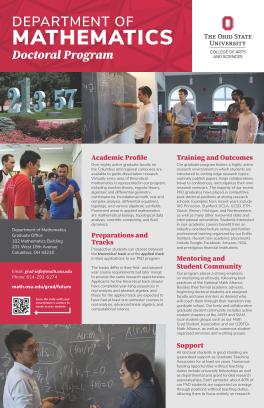
The Doctor of Philosophy (PhD) in mathematics is the highest degree offered by our program. Graduates will have demonstrated their ability to conduct independent scientific research and contribute new mathematical knowledge and scholarship in their area of specialization. They will be well-supported and well prepared for research and faculty positions at academic institutions anywhere in the world. Owing to their independence, analytic abilities, and proven tenacity, our PhD graduates are also sought after by private and government employers.
Our PhD program offers two tracks, one for Theoretical Mathematics and one for Applied Mathematics . The tracks differ only in the course and qualifying requirements during the first two years. Applicants are required to decide on one of the tracks and applications will be evaluated subject to respective criteria described below.
Once students have passed their Qualifying Requirements, the two tracks merge and there is no distinction in later examinations and research opportunities. In particular, the candidacy exam for both tracks consists of a research proposal, the graduate faculty available for advising is the same, and the final degree and thesis defense are independent of the initially chosen track.
Expected Preparations for Admission
Competitive applicants to the theoretical track are expected to have strong foundations in Real Analysis and Abstract Algebra, equivalent to our Math 5201 - 5202 and Math 5111 - 5112 sequences.
Expected preparations for the applied track include the equivalents of a rigorous Real Analysis course (such as Math 5201 ), a strong background in Linear Algebra, as well as an introductory course in Scientific Computing.
Besides these basic requirements, competitive applicants in either track submit evidence for a broad formation in mathematics at the upper-division or beginning graduate level. Relevant coursework in other mathematical or quantitative sciences may also be considered, especially for the applied track.
Prior research experiences are not required for either track, and we routinely admit students without significant research background. Nevertheless, applicants are encouraged to include accounts of research and independent project endeavors as well as letters of supervising mentors in order to be more competitive for fellowship considerations. The research component is likely to have greater weight in applications to the applied track.
These prepared documents serve to provide our admission committee with a narrative overview of the applicant's mathematical trajectory. Their primary focus should, therefore, be to enumerate and describe any evidence of mathematical ability and mathematical promise. The information included in the documents should be well-organized, comprehensive, informative, specific, and relevant. This will help our committee to properly and efficiently evaluate the high number of applications we receive each year.
Our Graduate Recruitment Committee will generally not consider GRE test scores for this Autumn 2024 admissions. If you have already taken the test, please do not self-report the scores to us. In exceptional circumstances students may have the option to report unofficially.
International students whose native language is not English and are not exempt should score at least a 20 on the Speaking portion of the TOEFL or at least 6.5 on the IELTS Speaking portion. We also recommend an overall score of at least 95 on TOEFL or at least 7.0 on IELTS. For a list of exempt countries, please see https://gpadmissions.osu.edu/intl/additional-requirements-to-apply.html
Qualifying Requirements by Track
The qualifying requirements for the theoretical track are fulfilled by passing our Abstract Algebra course sequence ( Math 6111 , Math 6112 ) and our Real Analysis course sequence ( Math 6211 , Math 6212 ), each with at least an A-, or by passing a respective examination.
The qualifying requirements for the applied track combine a mandatory Scientific Computing course ( Math 6601 ), one of the algebra or analysis courses, and three additional courses chosen from Math 6602 , Math 6411 , Math 6451 , and the courses comprising the algebra and analysis sequences.
The breadth requirements in the applied track are more flexible than in the theoretical track, but also include a mandatory graduate course in a non-math STEM department from an approved list.
You can find more information about our PhD program requirement here .
Opportunities & Outcomes
The research opportunities and academic outcomes of our doctoral program are described in detail in the Graduate Program Prospectus [pdf].
Our department has about 80 active graduate faculty on the Columbus and regional campuses. Virtually every area of mathematics is represented in our program, with a sampling displayed below.
- Commutative, Non-commutative, & Quantum Algebra
- Analytic, Algebraic, Computational Number Theory
- Algebraic Geometry, Tropical Geometry
- Applied Mathematics, Mathematical Physics
- Real and Complex Analysis
- Functional Analysis, Operator Algebras
- Combinatorics and Graph Theory
- Differential Geometry
- Dynamical Systems and Ergodic Theory
- Financial and Actuarial Mathematics
- Logic and Foundations
- Probability Theory, Statistical Mechanics
- Mathematical Biology
- Ordinary and Partial Differential Equations
- Representation theory
- Scientific Computing
- Topology, Topological Data Analysis
See also our Applied Mathematics Topics List [pdf].
Our program offers many support opportunities without teaching duties as well, to allow more time for scientific endeavors. These opportunities include university fellowships, external funding, and departmental fellowships and special assignments. See the Financial Support page for more details.
The median time to degree completion in our program is below six years but also varies significantly among our students, with as little as four years for students entering with substantial prior preparations. Funding is guaranteed for six years and can be extended to seven years with advisor support and the permission of the Graduate Studies Committee.
Most of our graduates continue their careers in academia. Post-doctoral placements in the last two years include, for example, UCLA, Stanford, ETH-Zürich, Brown University, University of Michigan, Northwestern University, University of Vienna, EPF Lausanne, Free University at Berlin, Purdue University, and University of Utah. In recent years our graduates also went to Princeton University, IAS, University of Chicago, Yale University, University of Michigan, Cal-Tech, Northwestern University, University of Texas, Duke University, SUNY Stony Brook, Purdue University, University of North Carolina - Chapel Hill, and Indiana University. Recent non-academic placements include Google, Facebook, Amazon, NSA, and prestigious financial institutions.
Students also have access to training and networking opportunities that prepare them better for careers in private industry and teaching - for example, through the Erdős Institute - and are regularly offered highly competitive positions in the industry.
Nearly half of the graduate population consists of domestic students coming from both larger universities and smaller liberal arts colleges with a solid math curriculum. And as a program group member of the National Math Alliance , we are dedicated to enhancing diversity in our program and the scientific community. The International students in our program come from all parts of the world with a wide variety of educational backgrounds.
Prospective students: [email protected]
Graduate Office Department of Mathematics The Ohio State University 231 W 18th Avenue ( MA 102 ) Columbus, Ohio 43210 United States of America
Phone: (614) 292-6274 Fax: (614) 292-1479
[pdf] - Some links on this page are to .pdf files. If you need these files in a more accessible format, please email [email protected] . PDF files require the use of Adobe Acrobat Reader software to open them. If you do not have Reader, you may use the following link to Adobe to download it for free at: Adobe Acrobat Reader .

Mathematics and Philosophy
- Admissions Requirements
- Fees and Funding
- Studying at Oxford
Course overview
UCAS code: GV15 Entrance requirements: A*A*A with the A*s in Maths and Further Maths if taken. Course duration: 3 years (BA); 4 years (MMathPhil)
Subject requirements
Required subjects: Maths Recommended subjects: Further Maths Helpful subjects: Not applicable
Other course requirements
Admissions tests: MAT Written Work: None
Admissions statistics*
Interviewed: 39% Successful: 12% Intake: 19 *3-year average 2021-23
Maths contact
Email: [email protected]
Philosophy contact
Tel: +44 (0) 1865 276926 Email: [email protected]
Unistats information for this course can be found at the bottom of the page
Please note that there may be no data available if the number of course participants is very small.
About the course
This course brings together two of the most fundamental and widely applicable intellectual skills.
Mathematical knowledge, and the ability to use it, is the most important means of tackling quantifiable problems. Philosophical training enhances the ability to analyse issues, question received assumptions and clearly articulate understanding. The combination provides a powerful background from which to proceed to graduate study in either mathematics or philosophy or to pursue a diverse range of careers.
Historically, there have been strong links between mathematics and philosophy. Logic, an important branch of both subjects, provides a natural bridge between the two, as does the Philosophy of mathematics module.
The degree is founded on the belief that the parallel study of these related disciplines can significantly enhance your understanding of each.
The Philosophy Faculty is the largest in the UK, and one of the largest in the world. We have more than 70 full-time members and admit around 450 undergraduates annually to read our various degrees involving philosophy.
Many faculty members have a worldwide reputation, and the faculty has one of the highest research ratings of any philosophy department in the UK. The Philosophy Library is among the best in the country.
The large number of undergraduates and graduates reading philosophy with a variety of other disciplines affords the opportunity to participate in a diverse and lively philosophical community.
In turn the Mathematics Department, housed in the Andrew Wiles Building, is also one of the largest and best in the UK and contains within it many world-class research groups. This is reflected in the wide choice of mathematics topics available to you, especially in the fourth year.
Unistats information
Discover Uni course data provides applicants with Unistats statistics about undergraduate life at Oxford for a particular undergraduate course.
Please select 'see course data' to view the full Unistats data for Mathematics and Philosophy.
Please note that there may be no data available if the number of course participants is very small.
Visit the Studying at Oxford section of this page for a more general insight into what studying here is likely to be like.
A typical week
- Years 1 and 2: up to ten lectures a week, two–three tutorials a week
- Years 3 and 4: up to eight lectures a week. Equivalent of eight units taken each year. Weekly tutorials per philosophy subject. Fortnightly classes per mathematics unit.
Tutorials are usually 2-4 students and a tutor. Class sizes may vary depending on the options you choose. There would usually be around 8-12 students though classes for some of the more popular papers may be larger.
Most tutorials, classes, and lectures are delivered by staff who are tutors in their subject. Many are world-leading experts with years of experience in teaching and research. Some teaching may also be delivered by postgraduate students who are usually studying at doctoral level.
To find out more about how our teaching year is structured, visit our Academic Year page.
Course structure
There are two Mathematics and Philosophy degrees, the three-year BA and the four-year MMathPhil. Decisions regarding continuation to the fourth year do not have to be made until the third year.
The mathematics units in this joint course are all from the single-subject Mathematics course. Accordingly the standard in mathematics for admission to the joint course is the same as for admission to the single-subject Mathematics course.
The compulsory core mathematics for the joint course consists mainly of the pure (as opposed to applied) mathematics from the compulsory core for the single-subject Mathematics course. The philosophy units for the Mathematics and Philosophy course are mostly shared with the other courses with philosophy.
In the first year, all parts of the course are compulsory.
In the second and third years some subjects are compulsory. These consist of core mathematics and philosophy and bridge papers on philosophy of mathematics and on foundations (logic and set theory), but you also choose options.
In the fourth year there are no compulsory subjects, and you can do all mathematics, all philosophy, or a combination of the two.
Years 2 and 3
The content and format of this course may change in some circumstances. Read further information about potential course changes .
Academic requirements
Wherever possible, your grades are considered in the context in which they have been achieved.
Read further information on how we use contextual data .
If a practical component forms part of any of your science A‐levels used to meet your offer, we expect you to pass it.
If English is not your first language you may also need to meet our English language requirements .
All candidates must follow the application procedure as shown on our Applying to Oxford pages.
The following information gives specific details for students applying for this course.
Admissions test
All candidates must take the Mathematics Admissions Test (MAT) as part of their application.
Guidance on how to prepare can be found on the MAT page .
New arrangements for 2024 admissions tests and beyond are still to be confirmed but will be communicated as soon as possible and no later than the start of the new admissions cycle in early Spring.
Written work
You do not need to submit any written work when you apply for this course.
What are tutors looking for?
During the interview for philosophy you will be given the opportunity to show a critical and analytical approach to abstract questions and the ability to defend a viewpoint by reasoned argument.
In mathematics you may find yourself asked to look at problems of a type that you have never seen before. Don’t worry, we will help you! We want to see if you can respond to suggestions as to how to tackle new things, rather than find out simply what you have been taught.
Visit the Mathematics website and Philosophy website for more detail on the selection criteria for this course.
Graduates secure positions in diverse areas, both in the UK and abroad, such as:
- software development
- the public sector, including the Civil and Diplomatic Services
- journalism.
Around 30% of graduates go on to further academic study.
Katherine currently works for the Bodleian Libraries. She found that the logical problem-solving skills and attention to detail she gained from studying mathematics came in useful when tackling new technical challenges in her work and whilst she completed a second graduate degree.
The experience of studying both subjects so intensely, and having to pick up and apply new knowledge quickly, gave her the confidence to work with new subject areas, including legal and medical research libraries.
Note: These annual fees are for full-time students who begin this undergraduate course here in 2024. Course fee information for courses starting in 2025 will be updated in September.
We don't want anyone who has the academic ability to get a place to study here to be held back by their financial circumstances. To meet that aim, Oxford offers one of the most generous financial support packages available for UK students and this may be supplemented by support from your college.
Further details about fee status eligibility can be found on the fee status webpage.
For more information please refer to our course fees page . Fees will usually increase annually. For details, please see our guidance on likely increases to fees and charges.
Living costs
Living costs at Oxford might be less than you’d expect, as our world-class resources and college provision can help keep costs down.
Living costs for the academic year starting in 2024 are estimated to be between £1,345 and £1,955 for each month you are in Oxford. Our academic year is made up of three eight-week terms, so you would not usually need to be in Oxford for much more than six months of the year but may wish to budget over a nine-month period to ensure you also have sufficient funds during the holidays to meet essential costs. For further details please visit our living costs webpage .
- Financial support
**If you have studied at undergraduate level before and completed your course, you will be classed as an Equivalent or Lower Qualification student (ELQ) and won’t be eligible to receive government or Oxford funding
Fees, Funding and Scholarship search
Additional Fees and Charges Information for Mathematics and Philosophy
There are no compulsory costs for this course beyond the fees shown above and your living costs.
Contextual information
Unistats course data from Discover Uni provides applicants with statistics about a particular undergraduate course at Oxford. For a more holistic insight into what studying your chosen course here is likely to be like, we would encourage you to view the information below as well as to explore our website more widely.
The Oxford tutorial
College tutorials are central to teaching at Oxford. Typically, they take place in your college and are led by your academic tutor(s) who teach as well as do their own research. Students will also receive teaching in a variety of other ways, depending on the course. This will include lectures and classes, and may include laboratory work and fieldwork. However, tutorials offer a level of personalised attention from academic experts unavailable at most universities.
During tutorials (normally lasting an hour), college subject tutors will give you and one or two tutorial partners feedback on prepared work and cover a topic in depth. The other student(s) in your tutorials will be doing the same course as you. Such regular and rigorous academic discussion develops and facilitates learning in a way that isn’t possible through lectures alone. Tutorials also allow for close progress monitoring so tutors can quickly provide additional support if necessary.
Read more about tutorials and an Oxford education
College life
Our colleges are at the heart of Oxford’s reputation as one of the best universities in the world.
- At Oxford, everyone is a member of a college as well as their subject department(s) and the University. Students therefore have both the benefits of belonging to a large, renowned institution and to a small and friendly academic community. Each college or hall is made up of academic and support staff, and students. Colleges provide a safe, supportive environment leaving you free to focus on your studies, enjoy time with friends and make the most of the huge variety of opportunities.
- Porters’ lodge (a staffed entrance and reception)
- Dining hall
- Lending library (often open 24/7 in term time)
- Student accommodation
- Tutors’ teaching rooms
- Chapel and/or music rooms
- Green spaces
- Common room (known as the JCR).
- All first-year students are offered college accommodation either on the main site of their college or in a nearby college annexe. This means that your neighbours will also be ‘freshers’ and new to life at Oxford. This accommodation is guaranteed, so you don’t need to worry about finding somewhere to live after accepting a place here, all of this is organised for you before you arrive.
- All colleges offer at least one further year of accommodation and some offer it for the entire duration of your degree. You may choose to take up the option to live in your college for the whole of your time at Oxford, or you might decide to arrange your own accommodation after your first year – perhaps because you want to live with friends from other colleges.
- While college academic tutors primarily support your academic development, you can also ask their advice on other things. Lots of other college staff including welfare officers help students settle in and are available to offer guidance on practical or health matters. Current students also actively support students in earlier years, sometimes as part of a college ‘family’ or as peer supporters trained by the University’s Counselling Service.
Read more about Oxford colleges and how you choose
FIND OUT MORE
- Visit the Mathematics Department's website
- Visit the Faculty of Philosophy's website

Our 2024 undergraduate open days will be held on 26 and 27 June and 20 September.
Register to find out more about our upcoming open days.
Mathematics Open Days - 20 April 2024 in person and 27 April 2024 online.
Mathematical Sciences Research
Mathematical Sciences at The University of Oxford was one listed as of the best in the UK in the most recent (2021) Research Excellence Framework (REF).
RELATED PAGES
- Which Oxford colleges offer my course?
- Your academic year
RELATED COURSES
Students interested in this course might also like to consider other Mathematics courses or Computer Science and Philosophy .
FEEL INSPIRED?
Why not have a look at the reading lists for prospective Mathematics and Philosophy applicants on the Maths Department's website ?
You can also find out more about the department's research at the Oxford Mathematics Alphabet .
For an introduction to philosophy have a look at Myles Burnyeat and Ted Honderich’s Philosophy , Martin Hollis' An Invitation to Philosophy and Simon Blackburn’s Think.
Follow us on social media
Follow us on social media to get the most up-to-date application information throughout the year, and to hear from our students.
University of Notre Dame
Department of Mathematics
College of Science
Math/Philosophy Math Graduate Programs
- Home ›
- Graduate ›
MSIM PROGRAM FOR PHILOSOPHY PhD STUDENTS, MAMP PROGRAM FOR MATHEMATICS PhD STUDENTS, AND JOINT MATH/PHILOSOPHY PhD PROGRAM
In collaboration with the Philosophy Department, the Mathematics Department at Notre Dame offers several joint programs for students interested in Mathematical Logic as well as Philosophy. The acronym MSIM stands for Master of Science in Interdisciplinary Mathematics, and this degree is given by the Mathematics Department. The program is available also to students from fields besides Philosophy. See this link: https://math.nd.edu/graduate/msim-degree/ for more information about joint Mathematics/Philosophy graduate degrees at Notre Dame. If you are a PhD student at Notre Dame interested in the MSIM degree with your primary area of interest not in Mathematical logic and Philosophy, the MAMP (Master of the Arts in Mathematical Philosophy) program may be of interest. See https://philosophy.nd.edu/graduate-program/mathematical-philosophy-minor/ for additional information about MAMP. This page gives instructions for how to apply for the MSIM, MAMP, or the joint PhD program in Mathematical Logic and Philosophy. Please contact the Math or Philosophy DGS if you have additional questions.
Admission to either of these degree programs requires the approval of both the Mathematics and Philosophy Departments. Similarly, any extension of the deadlines discussed below need the approval of the Mathematics and Philosophy Departments. Approval by the Philosophy Department requires primary approval by the Logic Group within that department, and final certification by the Philosophy DGS. Approval by the Math department requires approval by the Logic Group within that department in consultation with the Math DGS and if necessary, the graduate committee. As these degrees are additional degrees beyond the student’s Ph.D. program, they are not funded separately. We expect that the students earning these degrees will be exceptional.
A student in the joint PhD program will have to find a Mathematics adviser and a Philosophy adviser. The student will write a single PhD thesis, but it may have separate parts with a Math or Philosophy focus.
Philosophy Primary
An essential criterion for admission to the MSIM or Joint Degree for a Philosophy graduate student by the mathematics department is the approval of a mathematics department faculty member who agrees to oversee the student’s work. This will normally require that the student has become integrated into that faculty member’s research group, and has proposed a viable area for research. It is the student’s responsibility to find their own advisor. Given that, the path towards admission to the MSIM or Joint Degree is as follows:
- Year 1 and 2 (coursework): In addition to Philosophy coursework, the student takes the Mathematics department’s Logic Sequence Math 60510 and Math 60520 in Year 1. The student is also required to take two additional basic courses in mathematics. Basic Algebra I and II is a common choice, but other choices are possible. These courses should be completed in the first two years. S/he also, in this period, plays an active role in some part of the Mathematics department’s on-going research seminars, lectures, etc.
- Year 2: The student finds a faculty member willing to supervise some advanced work in that faculty member’s area. This might be over the first summer, during the second year, or during the second summer. The student should become well-integrated into the research group of the intended supervisor and take topics courses in Logic.
- Application to the MSIM program is made prior to the start of Year 3, and we encourage applicants interested in continuing to do the joint PhD program to apply well before the start of year 3. The application will include a description of the courses to be taken for the degree, and of the proposed Master’s thesis topic, both of which will have been designed in consultation with the proposed advisor along with letters of support from their advisors. It is expected that the student’s work in Mathematics classes outside Logic will be above average and similarly with their work in philosophy.
- If the student is admitted to the MSIM program, s/he will work during Year 3 with the Mathematics advisor on their thesis topic.
- Students interested in pursuing the joint PhD program should take the oral exam in Mathematics by the beginning of Year 4. This oral is understood to be similar to the one taken by students pursuing a Ph.D. in Mathematical Logic. Passing this oral exam is required to earn the Joint Ph.D.
- While working towards the MSIM degree, a student interested in pursuing the joint PhD program must express an intention to apply by the end of May of Year 3 and apply by the beginning of Year 4. An application consists of a description of the courses to be taken for the degree, a research proposal, hopefully some completed research and letters of support from their advisors. If the decision at that stage is that the student needs further work, then the student may submit a revised application during Year 4. In any event, if a philosophy student is to be accepted to the joint PhD program, this must happen by the first day of classes in the 5th year.
- If the student in the MSIM program is not admitted to the Joint PhD program, s/he will normally finish the requirements for, and be awarded, the MSIM degree on route to completion of the Philosophy PhD. In this case we expect the MSIM thesis to be completed by the end of Year 4. A public defense of the Master’s thesis is expected. The defense should happen by early in Year 5.
- If the student is admitted to the Joint PhD program, s/he need not complete the requirements for the MSIM degree. Research completed in pursuit of the MSIM thesis might be incorporated into the research for the joint PhD dissertation. We do expect this degree to be completed within 6 years.
Mathematics Primary
An essential criterion for admission to the MAMP or Joint PhD. for a mathematics graduate student by the Philosophy Department is the recommendation of a Philosophy Department faculty member who agrees to oversee the student’s work. This will normally require that the student has articulated a viable area for research and demonstrated to the satisfaction of the faculty member relevant competence to undertake a research project in the area. It is the student’s responsibility to find their own advisor.
- Years 1 and 2: The student should enroll in approximately 1 research seminar in the Philosophy Department each semester. [Generally, four philosophy seminar courses with a heavy writing component are needed for a student applying to the MAMP or joint PhD program.] Knowing that the application to the MAMP includes the submission of a sample of philosophical writing, it is wise to make sure to take seminars with substantial writing components so that by the time of application the student will have experienced several episodes of writing and rewriting in light of instructor feedback. Students should check with the instructor whether the course has a substantial writing component. Most seminars will fit this description, but some Logic seminars will not. Note that all seminars taken prior to application to the MAMP will be retroactively counted towards fulfillment of the MAMP (and/or Joint PhD.) degree. For students interested in MAMP or the joint PhD program,the Mathematics department can delay two of the required basic courses to the second year to allow students time to complete their philosophy seminars.
- An application to MAMP or the joint PhD program should consist of a transcript, the written work from Philosophy seminars, and a research paper, together with faculty evaluations.
- Year 2 or 3: Application to the MAMP should be made at the end of year 2 or during year 3. Students with a definite expectation to eventually apply to the Joint PhD program are strongly advised to apply before the start of year 3. Students with no plan to apply to the Joint PhD. program should in any event apply to the MAMP before the end of their 3rd year of study, so that the commencement of their MAMP thesis research does not disrupt the timely completion of their Mathematics dissertation research.
- Applications for the Joint PhD. will only be considered for students in their first four years of graduate study, and admission to the Joint PhD. must happen before the start of the student’s 5th year. A student applying to the Joint PhD. program need not complete their MAMP thesis; in many cases the work going towards that thesis will be further elaborated as the Philosophy component of their PhD. dissertation.
- A student who does not apply to the Joint PhD should submit their MAMP thesis by the end of their 4th year.
- A student admitted to the Joint PhD program should have a research plan suited for completion of the degree by the end of their 6th year.
Latest News
2024 nsf leaps-mps awards.
February 01, 2024
2023 Richard Sady Prize
October 13, 2023
- Costs, Scholarships & Aid
- Campus Life
- Faculty & Staff
- Family & Visitors
- DFW Community
- Galaxy Login
- Academic Calendar
- Human Resources
- Accessibility
Doctor of Philosophy in Mathematics
Program description.
The Mathematics PhD degree curriculum at The University of Texas at Dallas offers extensive coursework and intensive research experience in theory, methodology and applications of mathematics. During their study, PhD students acquire the necessary skills to prepare them for high-level careers in fields requiring mathematical sophistication. The PhD program is designed to accommodate the needs and interests of the students. The student must arrange a course program with the guidance and approval of the graduate advisor. Adjustments can be made as the student’s interests develop and a specific dissertation topic is chosen.
Some of the broad research areas represented in mathematics are as follows: algebraic and complex geometry; analysis and its applications; control theory and optimization; dynamical systems and ordinary differential equations; differential geometry; mathematical physics; mathematical methods in medicine, biology, geosciences and mechanics; numerical analysis and scientific computing; partial differential equations; and topology.
Career Opportunities
Graduates of the program seek positions such as: professor in an academic institution, or professional in industry, government or finance and researcher in public or private sector. Available emphases ensure that candidates can tailor their future career by having targeted their educational background to their research interests.
The jobs of a mathematician consistently appears among the top jobs in the rankings of 200 jobs by CareerCast’s Jobs Rated Almanac based upon factors such as work environment, income, hiring outlook and stress. For more information about careers in mathematics, view the career page of American Mathematical Society.
Marketable Skills
Review the marketable skills for this academic program.
Application Deadlines and Requirements
The university application deadlines apply with the exception that, for the upcoming Fall term, all application materials must be received by December 15 for first-round consideration of scholarships and fellowships. See the Department of Mathematical Sciences graduate programs website for additional information.
Visit the Apply Now webpage to begin the application process.
Contact Information
For more information, contact [email protected]
School of Natural Sciences and Mathematics The University of Texas at Dallas 800 W. Campbell Road Richardson, TX 75080-3021 Phone: 972-883-2416
nsm.utdallas.edu
Request More Information
We have received your request for more information. Our admissions team will contact you soon to share details about pursuing your academic goals at UT Dallas.
The University of Texas at Dallas respects your right to privacy . By submitting this form, you consent to receive emails and calls from a representative of the University.
* Required Field
Department of Philosophy
- Graduate Program >
Program in Logic and Foundations of Mathematics
The Departments of Philosophy and of Mathematics together offer a joint Ph.D. degree in Logic and the Foundations of Mathematics. Students in this program submit a single dissertation prepared under the supervision of members of both departments. Students enrolled in the Philosophy PhD program at Notre Dame can apply to the joint-degree program (typically during their third year of study). The joint-degree program does not accept applications from students outside of Notre Dame or admit students to the University.
The joint Ph.D. program continues a long tradition of the advanced study of formal logic at the University of Notre Dame.
Tim Bays (Philosophy) Jc Beall (Philosophy) Patricia Blanchette (Philosophy) Peter Cholak (Mathematics) Natasha Dobrinen (Mathematics) Curtis Franks (Philosophy) Joel David Hamkins (Philosophy and Mathematics) Julia Knight (Mathematics) Anand Pillay (Mathematics and Philosophy) Nicholas Ramsey (Mathematics) Sergei Starchenko (Mathematics)
Philosophy students interested in the joint program begin preparing to apply immediately upon beginning their studies at Notre Dame. In addition to philosophy coursework, they take at least the two semester logic sequence, and sometimes other courses, in the Mathematics Department in their first year. They also take part in the Mathematics Department's research seminars. By the second year, they have taken several courses in the Mathematics Department and become integrated into the research group of a Mathematics faculty member whom they intend to be their mathematics supervisor.
Most students will then choose to apply to the Master of Science in Interdisciplinary Mathematics (MSIM). This application describes a list of courses and a research project that the student and his or her mathematics supervisor propose. While working towards the MSIM, the student decides either to complete the degree as initially described or to expand the project into a joint program dissertation. In the latter case, the student applies to the joint-degree program.
Requirements
Students in the joint program are required to take only 27 credits in Philosophy. Joint Program students need to take only two of the three seminars in the history of philosophy that are required for the regular Philosophy PhD. program, and the 3 credit seminar "Intermediate Logic" is not required. Students are required to take the two course logic sequence, the two course algebra sequence, and 9 additional credits in the Mathematics Department.
Joint program students take the Mathematics Department's oral candidacy exam instead of the Philosophy Department's oral exam. This consists of both the basic and advanced exams in logic and the basic exam in one other area.
Matteo Bianchetti, MSIM: "Infinite Time Computation: Strong and Weak Infinite Time Turing Machines" (C. Franks, J. Knight); Ph.D. in Philosophy: "Geometric representations in mathematical problem-solving. Intuition and creativity" (C. Franks), Current Placement: non-academic
Paul Trần-Hoàng , MSIM: "Model-Theoretic Galois Cohomology" (A. Pillay, C. Franks); Ph.D. in Philosophy: "Model-Theoretic Approaches to Theoretical Equivalence and Reduction" (T. Bays, C. Franks). Current placement: Visiting Assistant Professor, Vassar College
Graham Leach-Krouse , Joint Ph.D.: "Conceptions of Absolute Provability" (T. Bays, M. Detlefsen, P. Larson). Current placement: Associate Professor, Department of Philosophy, Kansas State University.
Chris Porter , Joint Ph.D.: "Mathematical and Philosophical Perspectives on Algorithmic Randomness" (P. Cholak, M. Detlefsen, C. Franks). Current placement: Assistant Professor, Department of Mathematics and Computer Science, Drake University.
Sean Walsh , Joint Ph.D.: "Arithmetical Knowledge and Arithmetical Definability: Four Studies" (P. Cholak, M. Detlefsen). Current placement: Associate Professor, Logic and Philosophy of Science, UCLA
Andy Arana , Joint PhD: "Arithmetical Investigations: A Study of Models of Arithmetic and Purity of Methods" (M. Detlefsen, J. Knight). Current placement: Professor of Philosophy, University of Lorraine and Archives Henri-Poincaré.

Graduate Study in Logic at Berkeley
The Ph.D. Program in Philosophy . Students who choose to specialize in logic within the context of this program are expected to obtain a broad education in philosophy.
The Group in Logic and the Methodology of Science administers a program leading to the degree of Ph.D. in Logic and the Methodology of Science. The Group is not a part of the Department of Mathematics or of the Department of Philosophy; rather, it is an independent program staffed by faculty members from Mathematics and Philosophy, along with several from Electrical Engineering and Computer Science. Students who want to pursue the Ph.D. in Logic and the Methodology of Science should apply directly to the Graduate Program in Logic and the Methodology of Science, rather than to Mathematics or Philosophy.
Students in the L&M program are expected to study both mathematics and philosophy, though they need not meet all the breadth requirements for a Ph.D. in either field. They must pass one examination in the foundations of mathematics, one examination in philosophy (Area I), and a third in either mathematics or philosophy. Although there are no graduate instructorships in Logic and Methodology of Science, students in this program may, if qualified, hold graduate student instructorships in the Department of Mathematics or in the Department of Philosophy.
The Department of Mathematics administers a program leading to a Ph.D. in Mathematics. Students in this program may specialize in the foundations of mathematics, but are also expected to study other aspects of mathematics. In particular, they must pass departmental qualifying examinations in two other areas as well as in the foundations of mathematics. The Department of Mathematics also has a program leading to an M.A. degree.
Logic Events
Logic colloquium.
The Group in Logic and the Methodology of Science sponsors a biweekly logic colloquium , with talks by mathematicians, computer scientists, and philosophers.
Working Group in the History and Philosophy of Logic, Mathematics, and Science
The Working Group in the History and Philosophy of Logic, Mathematics, and Science , jointly sponsored by the Philosophy Department and the Doreen B. Townsend Center for the Humanities , sponsors monthly talks, many of them on topics connected to logic.
Berkeley-Stanford Circle in Logic and Philosophy
The Berkeley-Stanford Circle in Logic and Philosophy brings together graduate students from UC Berkeley and Stanford University to discuss research at the intersection of Logic and Philosophy.
Doctor of Philosophy in Mathematics
- Fall January 10
- Spring September 10
International students may need to surpass the Graduate School’s minimum English language proficiency exam scores for this program. If the graduate program has unique score requirements, they will be detailed below. Otherwise, please refer to the Graduate School’s minimum score guidelines.
- 540 TOEFL Minimum score for admission
- 75 TOEFLI Minimum score for admission
- 6.5 IELTS Minimum score for admission
- 105 Duolingo Minimum score for admission
Degree Description:
PhD in Mathematics This degree is awarded in recognition of distinctive scholarship and original contributions to knowledge in Mathematics. The PhD program is especially designed to prepare the student for teaching at the graduate level and doing mathematical research in academic, industrial and business settings. Students studying various fields within the realm of pure mathematics would be included in this PhD program.
PhD in Mathematics (Applied Mathematics Option) The specialization of modern academic disciplines provides both a challenge to those who wish to do research at the interface of mathematics and its areas of application and many opportunities to make valuable contributions. The Applied Mathematics Option allows students from a range of backgrounds to pursue a traditional applied mathematics program, while retaining the option to thoroughly learn an area of application. Entering students may not necessarily have a bachelor’s degree in Mathematics. However, they will be required to demonstrate a grasp of the core areas of advanced calculus and linear algebra at the level of a bachelor’s degree in Mathematics. They will then be given great latitude to take specialized courses in Mathematics and their area of application.
PhD in Mathematics with Education Emphasis The degree of PhD in Mathematics with Education Emphasis is awarded in recognition of scholarship and original contributions to the teaching and learning of mathematics. The main difference from the other PhD choices is in the research focus. The requirements for this PhD include competence in core mathematics, as well as study in the research methodologies applicable to research in mathematics education.
Admission Requirements:
Students should have taken upper-level analysis and linear algebra courses before applying, and have the equivalent of an undergraduate degree in mathematics, statistics, or a related field. Additional upper-level courses like abstract algebra, functional or complex analysis, optimization, applied mathematics, topology, etc. will be taken into account.
For international students, either a TOEFL, IETLS or Duolingo score is required. The minimum score for admission is listed above. The minimum score required for assistantship consideration is TOEFL score of 100, IELTS of 7, or Duolingo of 130. Exceptions can be found here: https://gradschool.wsu.edu/international-requirements/
Students applying to the PhD Mathematics program will be automatically considered for an assistantship position.
The application will require:
- Unofficial transcripts from all previous institutions.
- GPA above a 3.0 on a 4.0 scale.
- Email contact information for 3 references.
- Personal statement. The personal statement is your chance to highlight relevant experiences and discuss your future research interests.
- GRE scores are not required but encouraged.
Career Opportunities:
Academia (tenure-track positions at universities and colleges worldwide), Bio-statistics (health and pharmaceutical companies), Risk analysis (financial and insurance companies, investment management), Research (state or federal government, software development), Mathematics education (publishing, consulting and developing of educational software).
Career Placements:
Graduates from the Mathematics PhD program begin careers in both academia and government or industry. A few examples of career placements in academia from the past few years include:
- Postdoc, USDA Northwest Climate Hub and WSU Center for Sustaining Agriculture
- Assistant Professor, Central Washington University
- Assistant Professor, Marian University (WI)
A few examples of career placements in government and industry from the past few years include:
- Regulatory Data Scientist, Office of Regulatory Innovation and Assistance, Washington State Government
- Quantitative Model Validation Analyst, First Tech Federal Credit Union (OR)
- Data Scientist, Emsi Labor Market Analytics (ID)
Contact Information:
- Graduate Coordinator [email protected]

Search form
- Travel & Maps
- Our Building
- Supporting Mathematics
- Art and Oxford Mathematics
- Equality, Diversity & Inclusion
- Undergraduate Study
- Postgraduate Study
- Current Students
- Research Groups
- Case Studies
- Faculty Books
- Oxford Mathematics Alphabet
- Oxford Online Maths Club
- Oxford Maths Festival 2023
- It All Adds Up
- Problem Solving Matters
- PROMYS Europe
- Oxfordshire Maths Masterclasses
- Maths Week England
- Outreach Information
- Mailing List
- Key Contacts
- People List
- A Global Department
- Research Fellowship Programmes
- Professional Services Teams
- Conference Facilities
- Public Lectures & Events
- Departmental Seminars & Events
- Special Lectures
- Conferences
- Summer Schools
- Past Events
- Alumni Newsletters
- Info for Event Organisers & Attendees

Doctor of Philosophy (DPhil)
What is a dphil.
A DPhil is Oxford's name for a PhD - a higher research degree which allows you to make an original contribution to mathematics in the form of a thesis. A DPhil takes at least three years to complete, and around two thirds of our postgraduate leavers go on into academia (according to the latest destination data). During your DPhil, you will be supervised by at least one academic, although some students will have more than one supervisor (particularly if they are working across disciplines). Unlike CDT courses (and PhDs in other countries), you will begin to do research straight away and there is no prescribed taught component. However, you are very welcome to attend seminars and you can choose from a wide variety of taught courses and skills training to enhance your broader mathematical knowledge and develop your career. There may also be journal clubs or seminar series specific to your area of study. If you enjoy doing mathematics, and would like to be part of a lively and world-class research institute, then you should take a look at our research groups to see if they align with your own interests.
All applications should be submitted online through the University's Graduate Application Form . To find out more about how to apply, see the how to apply page, or go to the University of Oxford's graduate application guide .
For information about scholarships and funding , see the University of Oxford's fees, funding, and scholarship search .
Key Deadlines
Funding deadlines for students applying for EPSRC and Departmental awards
- 5th January 2024 (12:00 GMT)
- 1st March 2024 (12:00 GMT)
Please apply by the 5th January deadline if you would like to be considered for any centrally administered funds. Further information regarding these funds can be found here .
Fees and Funding
Information on University fees and funding can be found here .
Scholarships
Wang scholarship.
The Wang Scholarship is available to DPhil candidates and provides full fees and a stipend for four years.
Charles Coulson Scholarship in Mathematical Physics
This award is available to DPhil candidates in Mathematical Physics and provides full fees and a stipend for four years.
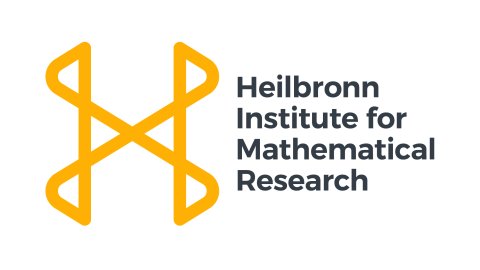
Heilbronn Doctoral Partnership Scholarship
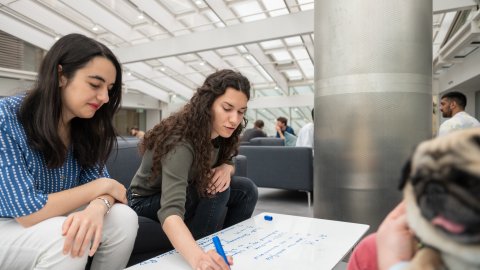
Oxford-Maryam Mirzakhani Scholarship
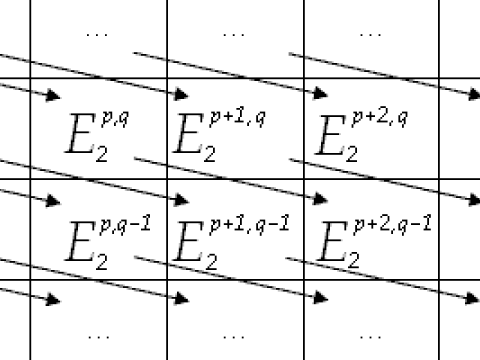
Research interests: group theory, representation theory and algebraic aspects of geometry.
Who's who in Algebra
Find out more about the group
Combinatorics
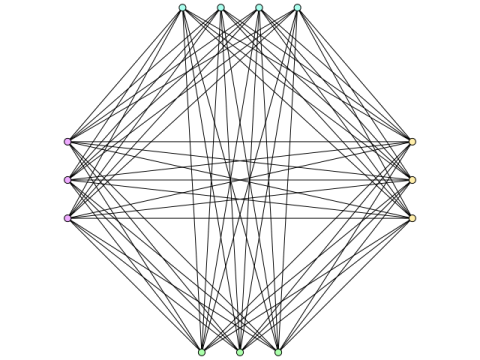
Research interests: extremal combinatorics, graph theory, and combinatorial number theory.
Who's who in Combinatorics
Functional Analysis
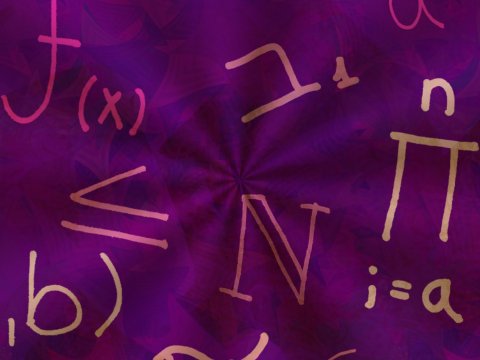
Research interests: operator theory, including unbounded operators, and abstract differential equations.
Who's who in functional analysis
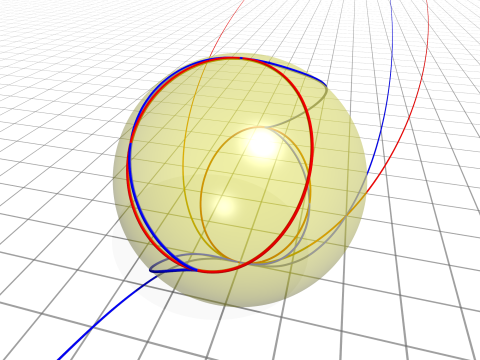
Research interests: algebraic geometry, geometric representation theory , and differential geometry.
Who's who in Geometry
History of Mathematics

Research interests: history of algebra (19th and 20th century), history of modern algebra, and Soviet mathematics.
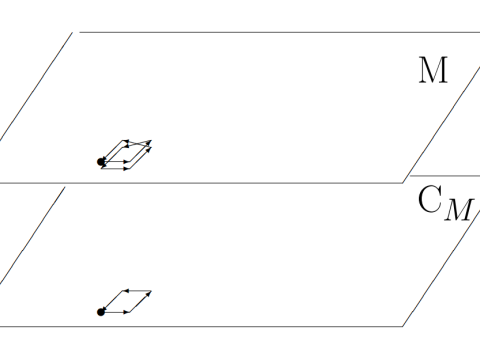
Research interests: analytic topology, geometric stability theory, and the model theory of p-adic fields and diophantine geometry.
Who's who in Logic
Machine Learning and Data Science

Machine Learning and Data science are being developed using wide ranging mathematical techniques. Our particular research expertise include: applied and computational harmonic analysis, networks, optimisation, random matrix theory, rough paths, topological data analysis, and the application of these methods.
Who's who in machine learning and data science
Mathematical & Computational Finance
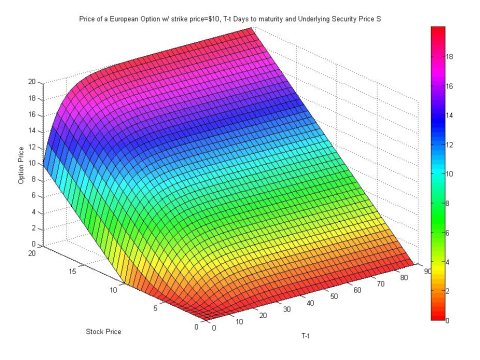
Research interests: behavioural finance, financial big data, high dimensional numerical methods, stochastic analysis.
Who's who in Mathematical and Computational Finance
Mathematical Biology
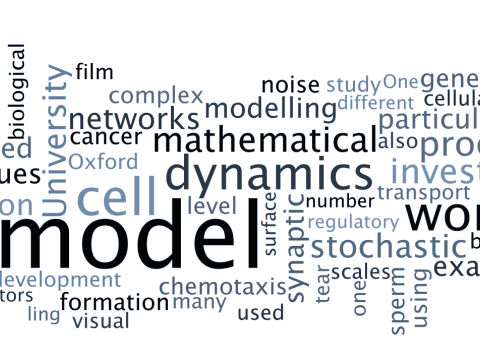
Research interests: cancer modelling, collective behaviour, gene regulatory networks, multiscale modelling, pattern formation, and sperm dynamics.
Who's who in Mathematical Biology
Mathematical Physics
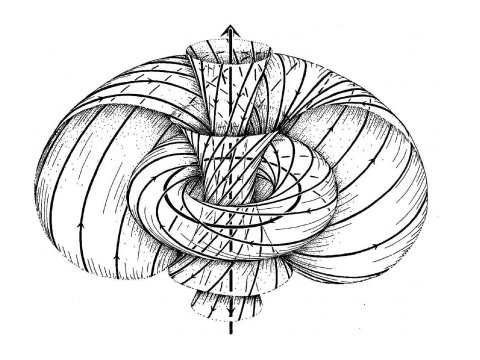
Research interests: gauge and gravity theories (quantum field theories), string theory, twistor theory, Calabi-Yau manifolds, quantum computation and cryptography.
Who's who in Mathematical Physics
Number Theory
Research interests: analytic number theory, arithmetic geometry, prime number distribution, and Diophantine geometry.
Who's who in Number Theory
Numerical Analysis
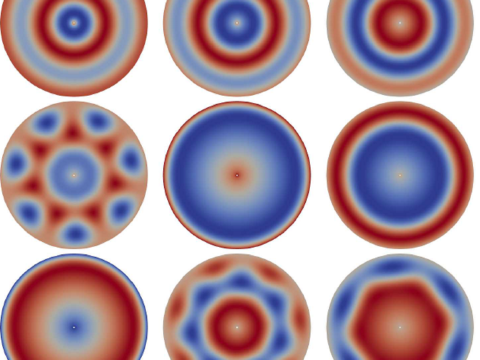
Research interests: complexity in optimisation, symmetric cone programming, numerical solutions of PDEs.
Who's who in Numerical Analysis
Oxford Centre for Industrial and Applied Mathematics
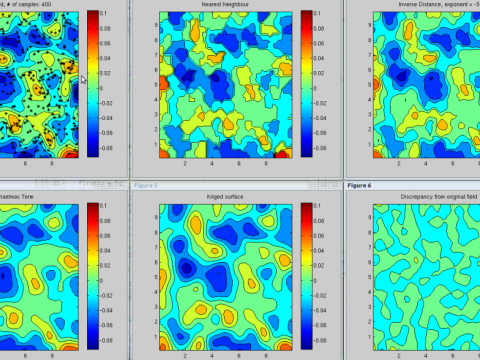
Research interests: energy, industry, geoscience, networks, finance, methodologies.
Who's who in OCIAM
Oxford Centre for Nonlinear Partial Differential Equations
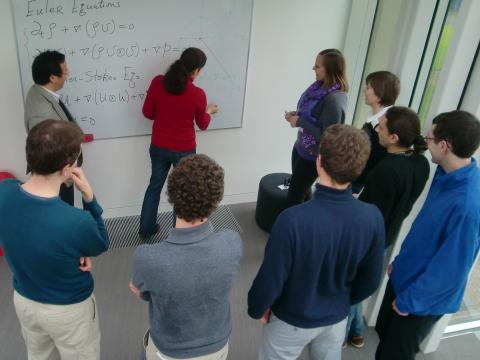
Research interests: geometric analysis, inverse problems, nonlinear hyperbolic systems, specific PDE systems.
Who's who in OxPDE
Stochastic Analysis
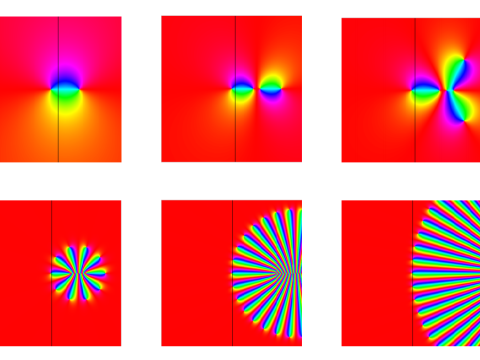
Research interests: rough path theory, Schramm-Loewner evolution, mathematical population genetics, financial mathematics, self-interacting random processes.
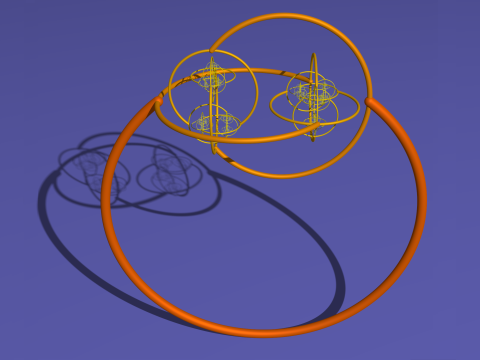
Research interests: geometric group theory, 3-manifold topology and knot theory, K-theory, algebraic topology.
Who's who in Topology

Centre for Doctoral Training (CDT)
- Department of Mathematics
Graduate Studies
- Mathematics, PhD
Doctor of Philosophy in Mathematics (Ph.D.)
Requirements outline.
The Ph.D. degree is a research degree and the principal requirement is that a student writes an original research thesis. The thesis is produced under the supervision of a faculty member and is examined by a committee of three departmental faculty and an outside expert. To qualify to write a thesis, a candidate for a Ph.D. in mathematics first must pass three Preliminary Examinations. It is recommended that Ph.D. candidates discuss possible research opportunities with the Director of Graduate Studies and/or faculty members soon after they enter the Ph.D. Program. Entering students should outline an appropriate sequence of courses to learn the essential material for pursuing their research interests. After a student has passed the Preliminary Examinations they must choose an advisor from the Mathematics Department faculty. A candidate's thesis usually is developed and written with the guidance of this advisor who will later chair the thesis defense committee. The time required to obtain a Ph.D. degree varies a lot. The department does not support graduate students as Teaching Assistants for more than five academic years.
Ph.D. Degree Requirements
The requirements that must be satisfied for a candidate to receive a Ph.D. include:
- The candidate must pass Preliminary Examinations .
- The candidate must obtain a grade of B or better in at least 24 semester credit hours of courses in the Mathematics Ph.D. program. Students should take doctoral research classes MATH 8x98 (where “x” is the number of credit hours) while conducting thesis research. Students must register for. the course MATH 8x99 “Doctoral Dissertation” in the semester when they intend to graduate
- After passing all three Preliminary Examinations the candidate is subject to Annual Performance Review (APR). The APR evaluates research progress of the candidate. The APR is conducted in oral or written form by a committee consisting of at least two faculty members of the Mathematics Department. The APR committee is chaired by the candidate’s advisor. Candidates failing the APR are subject to termination from the Ph.D. program.
- The candidate must be in residence, and take 9 semester credit hours of courses, in two consecutive long semesters, Fall followed by Spring. Alternatively, the candidate must be in residence and take a full load in consecutive Spring, Summer, and Fall terms.
- The candidate must write a Doctoral Dissertation with the guidance of an advisor who is a regular faculty member of the Mathematics Department.
- The candidate must defend their Dissertation in a public examination by a thesis committee consisting of at least 4 members, three of whom are faculty members in the Mathematics Department and at least one member outside UH Mathematics Department.
- NSM Thesis and Dissertation General Guidelines and Instructions
- NSM Thesis and Dissertation Formatting Instructions
- NSM Thesis and Dissertation Submission Instructions
- NSM Checklist for Thesis and Dissertation Review
- NSM Deadlines & Academic Calendar : This link provides deadlines for the submission of Dissertations.
- *The Graduate Record Examination (GRE) is waived for the Ph.D program within the Department of Mathematics.
- International students can not exclusively register for online courses.
Course Selection:
- Information about courses may be found at this link .
- Students can discuss advisor selection process with the Director of Graduate Studies.
- The above is only an outline of the primary requirements for the degree. The Director of Graduate Studies and others can provide more detailed information about conditions. The college and the university may have further requirements as listed at College and websites.
- PhD students can take topics classes at Rice University, UT Health, UTMB, or Baylor College of Medicine. Students must submit the Inter-Institutional Course Registration Form to the Graduate Director for approval. Taking an outside class must be essential for the completion of graduate degree. Thus, students must obtain a prior approval of their PhD avisor (signature on the form).
- Course Selection Requests: Please contact the Director for Instructional Support and Coordination < [email protected] > for more information.
Teaching Opportunities for Ph.D. Students:
As a condition, a student should have experiences of teaching Calculus recitation class with reasonable teaching evaluation. For an international student, by Texas law, the student must pass the English SPEAK test or its equivalence.
All PhD applicants who submit their complete application before the appropriate deadline are automatically considered for Teaching Assistantship.
Please contact the Director for Instructional Support and Coordination for more information about course selection requests .
Preliminary Examinations:
The Preliminary Examination is the final step in assessing the student’s ability and appropriate mathematical background to undertake a program of supervised research and study leading to a Ph.D. in Mathematics. Students who have completed their Master's degree in Mathematics may often be ready to take the Preliminary Examination without further course study.
Preliminary Examinations are three-hour, closed book written examinations that are given in each of the topics listed below. The questions in the examination emphasize problem solving skills and mathematical ability as opposed to rote memorization.
Preliminary Examinations are usually offered twice a year: at the end of the Fall and Spring semesters.
Students who receive support from the Department of Mathematics are expected to pass the Preliminary Examination according to the rules below. For non-supported students, the University rules apply.
All students are supposed to pass three Preliminary Examinations before the beginning of their third year in the Ph.D. program.
The following rules apply:
1. Students must pass three Preliminary Examinations from the different topic groups listed below
2. At least one out of the three Preliminary Examinations must be a core sequence. Core sequences are:
Review information for the preliminary written examinations:
Additional problems from past preliminary exams:
All preliminary exams are based on the content of the corresponding course. Please contact the instructor who taught the corresponding course most recently to obtain the up-to-date information.
Natural Sciences and Mathematics
Mathematical sciences.
Doctor of Philosophy in Mathematics
The program offers extensive coursework and intensive research experience in theory, methodology, and applications of mathematics (see degree requirements ).
- Faculty members with broad and diverse research interests are available to supervise doctoral dissertations .
- Financial support in the form of assistantships, full tuition support, and scholarships and awards are provided. Additional scholarships are available for US citizens and permanent residents.
- Our students, both domestic and international, have a strong record of starting in full-time jobs right after graduation .
- Students have opportunities to participate in active seminar series in Algebra and Combinatorics ; Computational Science ; Geometry, Topology and Dynamical Systems ; and Nonlinear Analysis and Dynamical Systems ; and the departmental Colloquium series.
- To enhance career prospects, students can pursue Graduate Certificate in Data Science , and possibly use the certificate courses to fulfill the elective requirements.
- NSM Career Success Center is available to support professional development and experiential learning of students.
- GRE test score is not required for admission.
More than 85% of our 45 Mathematics PhD graduates since 2020, both domestic and international, secured full-time employment within a few months of receiving their degrees.
Placement of 2022 & 2023 Mathematics PhD Graduates
See a more complete list
Assistantships
Graduate Teaching Assistantships are offered to qualified PhD students on a competitive basis. These assistantships include a monthly stipend (currently set at $2,400) along with a full tuition waiver (covering 9 credit hours per term in the Fall and Spring semesters). The assistantship additionally covers the cost of health insurance purchased through the university and most fees. Graduate Research Assistantships for advanced PhD students are also available on some faculty members’ research grants. Typically, assistantship support is provided for five years and encompasses the Summer semester as well.
All admitted students are considered for assistantships; no separate application is necessary.
Scholarships, Fellowships & Awards
PhD students are additionally supported through the following awards:
- NSM McDermott PhD Admission Fellowship (for highly qualified new students, offered at the time of admission)
- Dean’s Fellowship and EEF Scholarship (for highly qualified new students who are U.S. citizens and permanent residents, offered at the time of admission)
- Julia Williams Van Ness Merit Scholarship and Mei Lein Fellowship
- Outstanding Teaching Assistant of the Year Award
- Dean of Graduate Education Dissertation Research Award
- Best Dissertation Award , David Daniel Thesis Award , and Outstanding Graduate Student Award
Conference Travel Support
NSM Conference Travel Award and Betty and Gifford Johnson Travel Award are available to provide financial support to PhD students to present their research at professional conferences.
- How To Apply
- Frequently Asked Questions
- Scholarships & Awards
- Office of Admissions and Enrollment
Graduate Resources
- Mathematics Research
- Statistics & Actuarial Science Research
- Graduate Advisors
- Mathematics Courses
- Statistics Courses
- Actuarial Science Courses
- Qualifying Exam Archive
- Office of Graduate Education
Ready to start your application?
Before you apply, visit our How to Apply page to get familiar with the admission requirements and application process.

2023-24 Academic Catalog
Doctor of philosophy in mathematics, why study mathematics.
Because mathematics is a framework upon which humanity builds an understanding of the world.
Mission of the Graduate Program:
The mission of the Graduate Program of the Department of Mathematics is to prepare students for leadership roles in meeting the mathematical needs of our society and to produce professional mathematicians for positions in universities, colleges, industry, governmental agencies, and research centers.
Doctor of Philosophy in Mathematics:
The Mathematics Department offers the degree of Doctor of Philosophy (Ph.D.) in Mathematics. The Ph.D. program provides broad and deep expertise in mathematics, culminating in a dissertation that includes significant original work. It is intended for students with a strong mathematical background who plan a career in research in academia or industry. A broad range of specialties is possible; research interests of department faculty include algebra, analysis, combinatorics, control theory, dynamical systems, geometry, numerical analysis, partial differential equations, probability, and statistics. There are two tracks: Pure Mathematics and Applied Mathematics. The requirements for each track are listed in the section Degree Requirements. College-wide requirements for graduate students may be found in the Graduate School Catalog .
Admission to Graduate Studies
An applicant seeking to pursue graduate study in the College may be admitted as either a degree-seeking or non-degree seeking student. Policies and procedures of Graduate Studies govern the process of Graduate admission. These may be found in the Graduate Studies section of the online catalog.
Please consult the Departments & Programs section of the online catalog for information regarding program-specific admissions criteria and requirements. Special admissions requirements pertain to Interdisciplinary Studies degrees, which may be found in the Graduate Studies section of the online catalog.
Admission to the Ph.D. in Mathematics
The minimum prerequisites for admission are:
- an undergraduate degree from an accredited institution with a program of study in mathematics;
- a record of achievement that shows strong promise of success in graduate school, including a 3.0 cumulative grade-point average in undergraduate studies and a 3.0 grade-point average in mathematics (department requirement);
- course work in abstract algebra, linear algebra, and advanced calculus or introduction to analysis (comparable to KU courses MATH 500 , MATH 558 , and MATH 590 ).
It is beneficial to have preparation in probability/statistics (comparable to MATH 627 / MATH 628 ) and/or numerical analysis (comparable to MATH 581 ). Although not required, it is also helpful to have taken introductory courses in complex analysis ( comparable to MATH 646 ), partial differential equations (comparable to MATH 647 ), geometry (comparable to MATH 660 / MATH 661 ), and/or topology.
The Mathematics Department currently does not require the general or subject Graduate Record Examination (GRE), although applicants may submit scores if they wish. International students whose native language is not English must fulfill English language requirements specified by university policies.
Applicants must submit a graduate application online , including the following required materials:
- Transcript from each college or university the applicant has attended (an official transcript must be sent upon acceptance and completion of degree).
- Applicant’s résumé/curriculum vitae.
- A list of the textbooks used in mathematics courses beyond calculus.
- A statement of purpose indicating the applicant’s mathematical preferences and interests.
- 3 letters of reference.
- International applicants must fulfill the University's requirements for English proficiency .
Incomplete applications will not be considered. The minimum admission requirements do not guarantee admission. The Department of Mathematics evaluates candidates and makes recommendations to the Office of Graduate Studies regarding admission. The number of students admitted to the program changes from year to year, and admissions are competitive based on all application materials.
There are no additional application forms for financial support. Students are considered for support based on merit. Most Ph.D. students accepted by the program receive an offer of financial support in the form of a Graduate Teaching Assistantship. The number of GTAs available is limited. Further information about applications and admissions is available from the Department of Mathematics .
Contact the department:
Kate Pleskac Graduate Program Coordinator Department of Mathematics 433 Snow Hall [email protected]
Ph.D. Degree Requirements
The department requires the student to meet the following requirements before taking the comprehensive examination.
- Pass two written qualifying examinations: one exam in either algebra or analysis and a second exam in either numerical analysis or probability/statistics. Both qualifying examinations must be completed by the beginning of the student’s fifth semester.
- Complete the required qualifying exam coursework: MATH 727 (Probability), MATH 765 (Analysis I), MATH 781 (Numerical Analysis I), MATH 791 (Abstract Algebra I). Passing a qualifying exam exempts a student from the corresponding course. This coursework must be completed before the preliminary examination.
- Pass a preliminary examination in an area close to the focus of the eventual doctoral dissertation. The preliminary examination must be completed by the beginning of the student’s eighth semester.
- To meet the Research Skills requirement, students must complete an introductory programming language course approved by the Graduate Committee. The course may have been taken at KU or at another university, either as a graduate or undergraduate. Students may meet the Research Skills requirement by passing EECS 138 or EECS 168 . Alternatively, students may complete a computing project approved by their advisor and the Graduate Committee demonstrating competence in either a programming language or the use of specialized software that supports the student’s research.
- The Responsible Scholarship requirement must be met by completing the departmental training in responsible scholarship for mathematicians. The training is offered every spring semester. Students must have passed the qualifying exams and be working with an advisor in order to participate.
- Complete the course requirements for a track in either Pure Mathematics or Applied Mathematics, as outlined below.
Note: Contact your department or program for more information about the qualifying exam coursework requirement, the research skills and responsible scholarship, and the current requirements for doctoral students. Current policies on Doctoral Research Skills and Responsible Scholarship are listed in the Graduate Studies section of the online catalog and in the KU Policy Library.
Pure Mathematics
This track requires:
In addition, the pure-track student must complete four additional MATH courses at the 800 level or above before the final examination. MATH 896 , MATH 899 , MATH 993 and MATH 999 may not be used to satisfy this requirement. MATH 990 may be used to satisfy this requirement only with Graduate Committee approval. Courses outside Mathematics may be used to satisfy this requirement only with Graduate Committee approval.
Applied Mathematics
In addition, the applied-track student must complete four additional MATH courses at the 800 level or above before the final examination. MATH 896 , MATH 899 , MATH 993 and MATH 999 may not be used to satisfy this requirement. MATH 990 may be used to satisfy this requirement only with Graduate Committee approval. Courses outside Mathematics may be used to satisfy this requirement only with Graduate Committee approval.

Examination Preparation
Normally the work required to prepare a student for the oral comprehensive examination (and to do research) includes one or more semesters of advanced courses, directed readings, and seminars. In the oral comprehensive examination, a student must show proficiency in the chosen area of mathematics. Precise areas of responsibility on this examination are discussed in detail with the advisory committee (the student’s advisor and two other members of the department’s Graduate Faculty).
In addition to meeting general requirements, the Ph.D. candidate in mathematics must complete a minimum of 28 credit hours of mathematics coursework (this number includes 1 credit hour of MATH 999 ). The minimum amount of credit hours is possible only if a student passes all Ph.D. qualifying exams in lieu of the preparatory coursework ( MATH 727 , MATH 765 , MATH 781 , MATH 791 ). The program routinely takes 12 semesters to complete when factoring in research and milestone exams. A typical student completes 72 or more credit hours when enrolled full-time.
Print Options
Send Page to Printer
Print this page.
Download Page (PDF)
The PDF will include all information unique to this page.
2023-24 Entire Catalog
All pages in the Academic Catalog

- Doctor of Philosophy in Mathematics (PhD)
- Graduate School
- Prospective Students
- Graduate Degree Programs
Canadian Immigration Updates
Applicants to Master’s and Doctoral degrees are not affected by the recently announced cap on study permits. Review more details
Go to programs search
Mathematicians use theoretical and computational methods to solve a wide range of problems from the most abstract to the very applied. UBC's mathematics graduate students work in many branches of pure and applied mathematics. The PhD program trains students to operate as research mathematicians. The focus of the program is on substantial mathematical research leading to the PhD dissertation. Students also develop their skills in presenting and teaching mathematics and its applications.
For specific program requirements, please refer to the departmental program website
What makes the program unique?
UBC has one of the largest and most vigorous departments of mathematics in Canada. Our faculty routinely win national and international awards for their research and teaching achievements. We have an engaged and sociable cohort of graduate students who are essential members of a broad selection of active research groups. Each group holds a variety of seminars and events that allow graduate students, postdoctoral fellows, visitors and faculty to enjoy regular interaction.
UBC is the headquarters for the Pacific Institute of Mathematical Sciences (PIMS). PIMS hosts a plethora of mathematical events such as conferences and summer schools, greatly enriching the scientific environment in the quantitative sciences at UBC. Our mathematics students are also regular participants at the nearby Banff International Research Station for Mathematical Innovation and Discovery. Finally, our Institute for Applied Mathematics provides options for interdisciplinary studies for PhD students who wish to work in applied and computational mathematics.
Being affiliated with the Institute for Applied Mathematics meant I could easily collaborate with other departments and not get stuck in a box for my degree. I also wanted a program where I could develop my skills as a teacher because it is something I enjoy and is useful should I stay in academia.
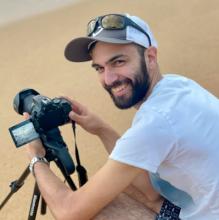
Nicholas Richardson
Quick Facts
Program enquiries, admission information & requirements, 1) check eligibility, minimum academic requirements.
The Faculty of Graduate and Postdoctoral Studies establishes the minimum admission requirements common to all applicants, usually a minimum overall average in the B+ range (76% at UBC). The graduate program that you are applying to may have additional requirements. Please review the specific requirements for applicants with credentials from institutions in:
- Canada or the United States
- International countries other than the United States
Each program may set higher academic minimum requirements. Please review the program website carefully to understand the program requirements. Meeting the minimum requirements does not guarantee admission as it is a competitive process.
English Language Test
Applicants from a university outside Canada in which English is not the primary language of instruction must provide results of an English language proficiency examination as part of their application. Tests must have been taken within the last 24 months at the time of submission of your application.
Minimum requirements for the two most common English language proficiency tests to apply to this program are listed below:
TOEFL: Test of English as a Foreign Language - internet-based
Overall score requirement : 100
IELTS: International English Language Testing System
Overall score requirement : 7.0
Other Test Scores
Some programs require additional test scores such as the Graduate Record Examination (GRE) or the Graduate Management Test (GMAT). The requirements for this program are:
The GRE is not required.
2) Meet Deadlines
3) prepare application, transcripts.
All applicants have to submit transcripts from all past post-secondary study. Document submission requirements depend on whether your institution of study is within Canada or outside of Canada.
Letters of Reference
A minimum of three references are required for application to graduate programs at UBC. References should be requested from individuals who are prepared to provide a report on your academic ability and qualifications.
Statement of Interest
Many programs require a statement of interest , sometimes called a "statement of intent", "description of research interests" or something similar.
Supervision
Students in research-based programs usually require a faculty member to function as their thesis supervisor. Please follow the instructions provided by each program whether applicants should contact faculty members.
Instructions regarding thesis supervisor contact for Doctor of Philosophy in Mathematics (PhD)
Citizenship verification.
Permanent Residents of Canada must provide a clear photocopy of both sides of the Permanent Resident card.
4) Apply Online
All applicants must complete an online application form and pay the application fee to be considered for admission to UBC.
Tuition & Financial Support
Financial support.
Applicants to UBC have access to a variety of funding options, including merit-based (i.e. based on your academic performance) and need-based (i.e. based on your financial situation) opportunities.
Program Funding Packages
All full-time students who begin a UBC-Vancouver PhD Mathematics program in September 2018 or later will be provided with a funding package of at least $24,256 for each of the first four years of their PhD. The funding package may consist of any combination of internal or external awards, teaching-related work, research assistantships, and graduate academic assistantships.
Average Funding
- 52 students received Teaching Assistantships. Average TA funding based on 52 students was $13,784.
- 48 students received Research Assistantships. Average RA funding based on 48 students was $11,580.
- 3 students received Academic Assistantships. Average AA funding based on 3 students was $1,814.
- 54 students received internal awards. Average internal award funding based on 54 students was $13,279.
- 4 students received external awards. Average external award funding based on 4 students was $27,083.
Scholarships & awards (merit-based funding)
All applicants are encouraged to review the awards listing to identify potential opportunities to fund their graduate education. The database lists merit-based scholarships and awards and allows for filtering by various criteria, such as domestic vs. international or degree level.
Graduate Research Assistantships (GRA)
Many professors are able to provide Research Assistantships (GRA) from their research grants to support full-time graduate students studying under their supervision. The duties constitute part of the student's graduate degree requirements. A Graduate Research Assistantship is considered a form of fellowship for a period of graduate study and is therefore not covered by a collective agreement. Stipends vary widely, and are dependent on the field of study and the type of research grant from which the assistantship is being funded.
Graduate Teaching Assistantships (GTA)
Graduate programs may have Teaching Assistantships available for registered full-time graduate students. Full teaching assistantships involve 12 hours work per week in preparation, lecturing, or laboratory instruction although many graduate programs offer partial TA appointments at less than 12 hours per week. Teaching assistantship rates are set by collective bargaining between the University and the Teaching Assistants' Union .
Graduate Academic Assistantships (GAA)
Academic Assistantships are employment opportunities to perform work that is relevant to the university or to an individual faculty member, but not to support the student’s graduate research and thesis. Wages are considered regular earnings and when paid monthly, include vacation pay.
Financial aid (need-based funding)
Canadian and US applicants may qualify for governmental loans to finance their studies. Please review eligibility and types of loans .
All students may be able to access private sector or bank loans.
Foreign government scholarships
Many foreign governments provide support to their citizens in pursuing education abroad. International applicants should check the various governmental resources in their home country, such as the Department of Education, for available scholarships.
Working while studying
The possibility to pursue work to supplement income may depend on the demands the program has on students. It should be carefully weighed if work leads to prolonged program durations or whether work placements can be meaningfully embedded into a program.
International students enrolled as full-time students with a valid study permit can work on campus for unlimited hours and work off-campus for no more than 20 hours a week.
A good starting point to explore student jobs is the UBC Work Learn program or a Co-Op placement .
Tax credits and RRSP withdrawals
Students with taxable income in Canada may be able to claim federal or provincial tax credits.
Canadian residents with RRSP accounts may be able to use the Lifelong Learning Plan (LLP) which allows students to withdraw amounts from their registered retirement savings plan (RRSPs) to finance full-time training or education for themselves or their partner.
Please review Filing taxes in Canada on the student services website for more information.
Cost Estimator
Applicants have access to the cost estimator to develop a financial plan that takes into account various income sources and expenses.
Career Outcomes
88 students graduated between 2005 and 2013: 1 is in a non-salaried situation; for 19 we have no data (based on research conducted between Feb-May 2016). For the remaining 68 graduates:
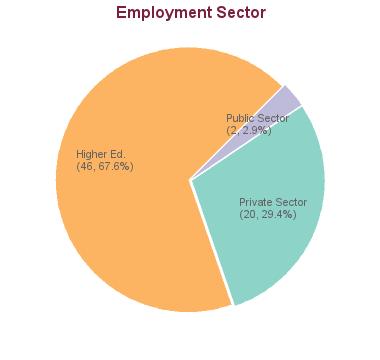
Sample Employers in Higher Education
Sample employers outside higher education, sample job titles outside higher education, phd career outcome survey, career options.
A great majority of our PhD graduates move on to postdoctoral fellowships and faculty positions at universities and research institutes in North America and around the world. However, a significant fraction of students move into careers in industry. Students considering non-academic careers are encouraged to complete an industrial internship (for instance through the Mitacs Accelerate program - headquartered at UBC) during their studies.
Enrolment, Duration & Other Stats
These statistics show data for the Doctor of Philosophy in Mathematics (PhD). Data are separated for each degree program combination. You may view data for other degree options in the respective program profile.
ENROLMENT DATA
Completion rates & times, upcoming doctoral exams, tuesday, 19 march 2024 - 12:30pm, tuesday, 26 march 2024 - 4:00pm - 4127, earth sciences building, 2207 main mall, thursday, 4 april 2024 - 9:00am, thursday, 4 april 2024 - 3:30pm.
- Research Supervisors
Advice and insights from UBC Faculty on reaching out to supervisors
These videos contain some general advice from faculty across UBC on finding and reaching out to a supervisor. They are not program specific.

This list shows faculty members with full supervisory privileges who are affiliated with this program. It is not a comprehensive list of all potential supervisors as faculty from other programs or faculty members without full supervisory privileges can request approvals to supervise graduate students in this program.
- Adem, Alejandro (Cohomology of finite groups, orbifolds, stringy topology, algebra, sporadic simple group, group actions, arithmetic groups, K-theory, homotopy theory, spaces of homomorphisms)
- Angel, Omer (Probability theory, percolation, random graphs, random walks, particle processes, scaling limits)
- Bachmann, Sven (Mathematics and statistics; Mathematical Analysis; quantum phenomena; Mathematical physics; Quantum statistical physics; Topological states of matter)
- Balmforth, Neil (Fluid mechanics, nonlinear dynamics and applied partial differential equations)
- Behrend, Kai (Moduli spaces, Gromov-Witten invariants, string theory, Donaldson-Thomas invariants, Euler characteristics, categorification)
- Bennett, Michael (Number Theory, Diophantine Approximation and Classical Analysis)
- Bryan, Jim (Algebraic and differential geometry; Algebraic geometry, moduli spaces, enumerative invariants related to theoretical physics.)
- Cautis, Sabin (Mathematics and statistics; Geometry)
- Chau, Albert (Differential Geometry and Partial Differential Equations)
- Chen, Jingyi (Algebraic and differential geometry; Differential Geometry, Partial Differential Equations)
- Colliander, James (hamiltonian dynamical systems; partial differential equations; harmonic analysis)
- Coombs, Daniel (Mathematical biology; Cellular immunology; Complex physical systems; Epidemiology (except nutritional and veterinary epidemiology); Cell Signaling and Infectious and Immune Diseases; Cell biophysics; Disease models; Epidemiology; Immune cell signalling; Mathematics)
- Cytrynbaum, Eric (Bacterial cell division, Microtubule and cellular organization, Wave propagation in excitable media)
- Dao Duc, Khanh (Genomics; Mathematical biology; Neurocognitive patterns and neural networks; Agricultural spatial analysis and modelling; combine mathematical,computational and statistical tools to study fundamental biological processes; regulation and determinants of gene expression and translation; Machine Learning for Biological Imaging and Microscopy; Database development and management; Biological and Artificial Neural Networks for geometric representation)
- Doebeli, Michael Walter (Mathematical ecology and evolution, evolution of diversity, adaptive speciation, evolution of cooperation, game theory, experimental evolution in microorganisms)
- Feng, James (Chemical engineering; Mathematics and statistics; Biophysics; Complex fluids; Fluid mechanics; Mathematical biology)
- Fraser, Ailana (Differential Geometry, Geometric Analysis)
- Friedlander, Michael (numerical optimization, numerical linear algebra, scientific computing, Scientific computing)
- Frigaard, Ian (Fluid mechanics (visco-plastic fluids))
- Ghioca, Dragos (Drinfeld modules, isotrivial semiabelian varieties, Lehmer inequality)
- Gordon, Julia Yulia (Representation theory of p-adic groups and motivic integration; Trace Formula and its applications)
- Gustafson, Stephen James (Mathematics and statistics; Mathematical Analysis; Differential Equation; Global and Non-Linear Analysis; Mathematical physics; Nonlinear partial differential equations; Nonlinear waves; Topological solitons)
- Hauert, Christoph (Mathematics and statistics; Modelization and Simulation; Evolution and Phylogenesis; Biological Behavior; dynamical systems; evolution; game theory; social dilemmas; stochastic processes)
- Hermon, Jonathan (probability theory; Markov chains and the cutoff phenomenon; particle systems; percolation)
- Holmes-Cerfon, Miranda (Mathematical modelling and simulation; Computational methods in statistics; Numerical analysis; Thermodynamics and statistical physics)
Doctoral Citations
Sample thesis submissions.
- Classifying space for commutativity and unordered flag manifolds
- Finite-size scaling of a few statistical physics models in high dimensions
- Residual supersingular Iwasawa theory and μ-invariants for Zₚ²-extensions
- Numerical methods for biological flows laden with deformable capsules and solid particles
- The construction of blow-up solutions for some evolution equations
- Topics in discrete analysis
- Inviscid damping phenomena in some fluid models
- Gibbs measures and factor codes in symbolic dynamics
- Deep reinforcement learning agents for industrial control system design
- Structure-preserving numerical schemes for phase field models
- Enumerative geometry problems for Calabi-Yau manifolds with an action
- Tamagawa numbers of symplectic algebraic tori, orbital integrals, and mass formulae for isogeny class of abelian varieties over finite fields
- Derived algebraic cobordism
Related Programs
Same specialization.
- Master of Science in Mathematics (MSc)
At the UBC Okanagan Campus
Further information, specialization.
Mathematicians use theoretical and computational methods to solve a wide range of problems from the most abstract to the very applied. UBC's mathematics graduate students work in many branches of pure and applied mathematics.
UBC Calendar
Program website, faculty overview, academic unit, program identifier, classification, social media channels, supervisor search.
Departments/Programs may update graduate degree program details through the Faculty & Staff portal. To update contact details for application inquiries, please use this form .

Gabriel Currier
I quite like the kind of math that people do here, and enjoy working with my supervisors. The campus is also a beautiful place and the graduate student community is pretty laid back and friendly.
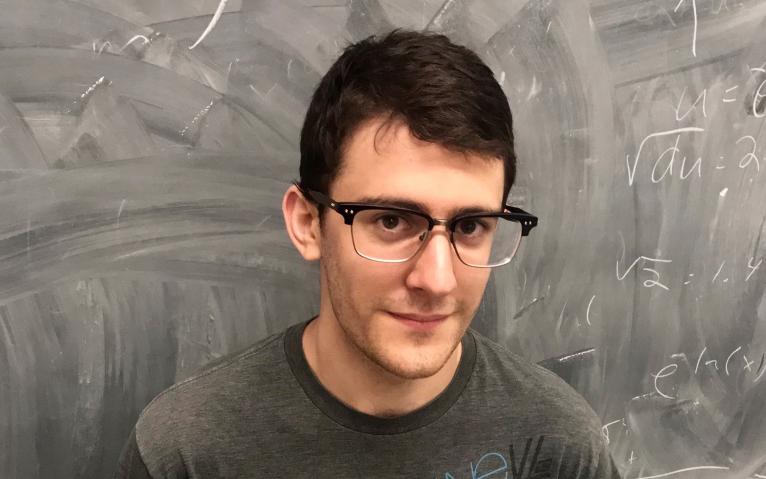
Nathan Lawrence
Many factors contributed to my choice of UBC for graduate school. I was attracted to Vancouver’s geographical similarities to Portland in the pacific northwest. Also, I have family in the area. However, most importantly, I was intrigued and inspired by my professors and advisors to take on the...

Ethan White
The reputation of the university and mathematics department, the alignment of my research interests with my advisor’s expertise, and my love for Canada!

Considering Vancouver as your next home?
This city won’t disappoint. It has it all: sea, parks, mountains, beaches and all four seasons, including beautiful summers and mild, wet winters with snow.
- Why Grad School at UBC?
- Application & Admission
- Info Sessions
- Research Projects
- Indigenous Students
- International Students
- Tuition, Fees & Cost of Living
- Newly Admitted
- Student Status & Classification
- Student Responsibilities
- Supervision & Advising
- Managing your Program
- Health, Wellbeing and Safety
- Professional Development
- Dissertation & Thesis Preparation
- Final Doctoral Exam
- Final Dissertation & Thesis Submission
- Life in Vancouver
- Vancouver Campus
- Graduate Student Spaces
- Graduate Life Centre
- Life as a Grad Student
- Graduate Student Ambassadors
- Meet our Students
- Award Opportunities
- Award Guidelines
- Minimum Funding Policy for PhD Students
- Killam Awards & Fellowships
- Policies & Procedures
- Information for Supervisors
- Dean's Message
- Leadership Team
- Strategic Plan & Priorities
- Vision & Mission
- Equity, Diversity & Inclusion
- Initiatives, Plans & Reports
- Graduate Education Analysis & Research
- Media Enquiries
- Newsletters
- Giving to Graduate Studies
Strategic Priorities
- Strategic Plan 2019-2024
- Improving Student Funding
- Promoting Excellence in Graduate Programs
- Enhancing Graduate Supervision
- Advancing Indigenous Inclusion
- Supporting Student Development and Success
- Reimagining Graduate Education
- Enriching the Student Experience
Initiatives
- Public Scholars Initiative
- 3 Minute Thesis (3MT)
- PhD Career Outcomes
- Great Supervisor Week
Doctor of Philosophy (PhD) in Mathematics Education
Graduate Programs
The Ph.D. program emphasizes research and requires a written dissertation for completion. The program is individualized to meet the needs of graduate students. The student must develop, with the guidance from the major professor and committee, a program that is applicable to their background and interest. The average Ph.D. program requires 4-6 years beyond a master’s degree. The program is comprised of coursework in four major areas.
- Mathematics Education
- Mathematics or a related area
- Cognate Area
- Research Core
This residential program has rolling admission Applications must be fully complete and submitted (including all required materials) and all application fees paid prior to the deadline in order for applications to be considered and reviewed. For a list of all required materials for this program application, please see the “Admissions” section below.
- July 1 is the deadline for Fall applications.
- November 15 is the deadline for Spring applications.
- March 15 is the deadline for Summer applications.
This program does not lead to licensure in the state of Indiana or elsewhere. Contact the College of Education Office of Teacher Education and Licensure (OTEL) at [email protected] before continuing with program application if you have questions regarding licensure or contact your state Department of Education about how this program may translate to licensure in your state of residence.
APPLICATION PROCEDURE
Application Instructions for the Mathematics Education PhD program from the Office of Graduate Studies:
In addition to a submitted application (and any applicable application fees paid), all completed materials must be submitted by the application deadline in order for an application to be considered complete and forwarded on to faculty and the Purdue Graduate School for review.
Here are the materials required for this application:
- Transcripts (from all universities attended, including an earned bachelor’s degree from a college or university of recognized standing)
- Minimum undergraduate GPA of 3.0 on a 4.0 scale
- 3 Recommendations
- Academic Statement of Purpose
- Personal History Statement
- Writing Sample
- International Applicants must meet English Proficiency Requirements set by the Purdue Graduate School
We encourage prospective students to submit an application early, even if not all required materials are uploaded. Applications are not forwarded on for faculty review until all required materials are uploaded.
When submitting your application for this program, please select the following options:
- Select a Campus: Purdue West Lafayette (PWL)
- Select your proposed graduate major: Curriculum and Instruction
- Please select an Area of Interest: Mathematics Education
- Please select a Degree Objective: Doctor of Philosophy (PhD)
- Primary Course Delivery: Residential
Program Requirements
I. mathematics education courses (15 – 18 hours).
In mathematics education, students engage in courses that cover topics in the cognitive and cultural theories of learning and teaching mathematics, and the role of curriculum in mathematics education. A three (3) course sequence is required that consists of:
- EDCI 63500 – Goals and Content in Mathematics Education
- EDCI 63600 – The Learning of Mathematics: Insights and Issues
- EDCI 63700 – The Teaching of Mathematics: Insights and Issues
In addition, students are encouraged to take (6 – 9) hours of EDCI 620: Developing as a Mathematics Education Researcher
II. Related Course Work (minimum 6 hours)
All students should have appropriate course work in mathematics, statistics, educational technology, or a related field. Students without a master’s level background in mathematics may be required to take more courses in mathematics. This will be determined by the student’s major professor and advisory committee.
III. Cognate (9 hours)
Students will take three graduate courses in a self-selected cognate area. Cognate area selection should be discussed with the student’s major professor and advisory committee. Possible cognate areas include: mathematics, psychology, philosophy, sociology, technology.
IV. Research Core Courses (15 hours)
All doctoral students in the Department of Curriculum and Instruction must complete five (5) courses from areas in research methodology and analysis before beginning their dissertation:
- EDPS 53300 – Introduction to Research in Education
- EDCI 61500 – Qualitative Research Methods in Education
- MA 51200 – Introductory Statistics
- Advance electives in either quantitative or qualitative methods
- Ackerman Center
- Serious Games
- CnI Online Fac
- Curriculum Studies
- Education for Work and Community
- Elementary Education
- English Education
- English Language Learning
- Learning Design and Technology
- Literacy and Language Education
- Science Education
- Social Studies Education
- Applied Behavior Analysis
- Counseling and Development
- Educational Leadership and Policy Studies
- Educational Psychology and Research Methodology
- Gifted Education
- Special Education
Laura Bofferding
Amber brown, signe kastberg, rachael kenney, jill newton.
Course Registration, payment, drops/withdraws, and removing holds: [email protected] Career accounts: ITaP (765) 494-4000
- Skip to Content
- Skip to Main Navigation
- Skip to Search
- Degrees & Programs
Mathematical Sciences - Doctor of Philosophy (Ph.D.)
The Ph.D. in Mathematical Sciences is offered in the Department of Mathematical Sciences.
Students earning a Ph.D. in Mathematical Sciences have the option to specialize in pure mathematics, applied mathematics or mathematical statistics.
Our department is currently doing research in integrable systems, mathematical physics, dynamical systems, noncommutative geometry, operator algebras, differential geometry, partial differential equations, functional analysis, statistics and probability, applied mathematics, biomathematics, computational neurosciences, and scientific computing.
Understanding the requirements
Students are required to complete 42 credit hours of coursework in the following:
Four core MATH subject courses
- Introduction to Complex Variables I, MATH 53000
- Real Analysis & Measure Theory, MATH 54400
- Abstract Algebra, MATH 55300
- Linear Algebra, MATH 55400
Two MATH or STAT subject courses
- Numerical Analysis, MATH 51400
- Partial Differential Equations, MATH 52300
- Differential Geometry, MATH 56200
- Elementary Topology, MATH 57100
- Introduction to Algebraic Topology, MATH 57200
- Introduction to Probability, STAT 519003
Three courses (9 credit hours of coursework) at an advanced level in your field of specialty
Students in the applied mathematics specialty will select two courses from MATH/CSCI 51400, 51500, 61400, 61500, and one course that uses advanced mathematics, taken outside the mathematical sciences.
This program requires completion of at least 90 credit hours of combined course work and research. An M.S. degree from an accredited university may contribute up to 30 credit hours toward this requirement, subject to approval.
Requirements
Read the requirements in the academic bulletin. Choose the bulletin year corresponding to your first term.
- 2021–2022
- 2020–2021
- 2019–2020
- 2018–2019
Offered at IUPUI by School of Science
Offered on campus
Download the Graduate Student Handbook
Career Services
See our PREPs page.
Take the next step
- Learn how to apply
Department of Philosophy
Dietrich college of humanities and social sciences.
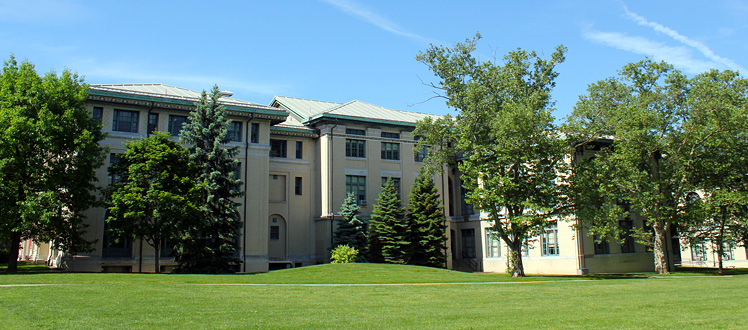
Logic and Philosophy of Mathematics
- Categorical Logic
- Computability and Automated Proof Search
- Homotopy Type Theory
- Philosophy and History of Mathematics
- Philosophy of Language and Linguistics
- Philosophical Logic
- Proof Theory
- Graduate Application
- Support Philosophy @ CMU
Philosophy of Mathematics

Jared Warren
PH.D. IN MATHEMATICS AND STATISTICS
Unlock diverse career paths with a ph.d. focused in applied continuous mathematics, applied discrete mathematics or applied statistics..
Oakland University’s Doctor of Philosophy (Ph.D.) in Mathematics and Statistics program offers comprehensive training across various disciplines, providing you with the expertise to take on complex, real-world challenges. Our rigorous mathematics and statistics degree prepares graduates for a broad range of careers with three specializations to choose from: applied continuous mathematics, applied discrete mathematics or applied statistics. Whether you aspire to a future in academia, business, industry or government, an advanced graduate degree in mathematics from Oakland is your gateway to a world of opportunities.
Ph.D. in Mathematics and Statistics: The Oakland University Advantage
Academic excellence and research are cornerstones of Oakland University’s Ph.D. in Mathematics and Statistics program. Our mathematics and statistics degree program is led by renowned experts who are actively engaged in groundbreaking research in applied mathematics and statistics. Many of our esteemed faculty members hold prestigious fellowships with organizations like the National Science Foundation and have earned recognition for their contributions to the field.
Other key advantages of Oakland’s Ph.D. in Mathematics and Statistics program include:
- Specializations: Tailor your advanced graduate degree in mathematics to your interests with three specialized areas. By focusing your studies in applied continuous mathematics, applied discrete mathematics or applied statistics, you can immerse yourself in the discipline that best aligns with your career goals.
- Renowned faculty: Our mathematics and statistics faculty members are internationally recognized experts in their respective fields and leaders in research. Their areas of expertise and research include mathematical modeling, discrete mathematics, algebra, differential equations and statistical analysis.
- Research opportunities: As a Ph.D. in mathematics candidate at OU, you’ll have access to cutting-edge research projects. We consistently secure grants from organizations like the National Science Foundation, providing substantial research support. This allows you to actively participate in meaningful research as you pursue your mathematics degree.
- Colloquium: The Department of Mathematics and Statistics hosts a vibrant colloquium series featuring speakers on topics in math, statistics and related fields. This series also offers an opportunity for Ph.D. candidates to present their dissertation findings.
What Can You Do With a Ph.D. in Mathematics and Statistics?
Our advanced graduate degree in mathematics and statistics opens doors to a world of diverse and rewarding career opportunities. With a versatile skill set and a deep understanding of mathematics and statistics principles, our graduates are well-equipped to thrive in various sectors, including education, science, technology, medicine and more.
Some potential career paths for our mathematics and statistics degree graduates include:
- Academic researcher
- Business analyst/consultant
- Data analyst
- Data scientist
- Financial mathematician
- Government analyst/researcher
- Market research analyst
- Operations research analyst
- Research scientist
- Software engineer
- Statistician
- University professor
Ph.D. in Mathematics and Statistics: What You’ll Learn
Our Doctor of Philosophy in Applied Mathematics and Statistics offers a comprehensive curriculum that equips you with the knowledge and problem-solving abilities required for a wide range of careers. In addition to coursework in your specialized area of applied continuous mathematics, applied discrete mathematics or applied statistics, you can explore a wide range of electives covering topics such as numerical methods, mathematical modeling, statistical analysis and more. The program culminates with a final oral examination and dissertation defense.
A minimum of 80 credits beyond the bachelor’s degree is required for the Ph.D. in Mathematics and Statistics, consisting of 60 credits (15 courses) of coursework and 20 credits of APM 9999 or STA 9999 (Dissertation Research). Up to three credits of APM 6945 or STA 6945 (Problem Solving Seminar) may be counted in the 20 dissertation credits. Students who have earned a master’s degree may petition to have prior coursework applied toward the 60 credits.
Mathematics and Statistics Degree Resources
- Academic requirements
- Department of Mathematics and Statistics
- College of Arts and Sciences
Related Programs
Not sure if the Ph.D. in Mathematics and Statistics is right for you? Explore these other Ph.D. programs at Oakland, and contact our admissions team to discuss your options.
- Applied and Computational Physics, Ph.D.
- Computer Science and Informatics, Ph.D.
- Electrical and Computer Engineering, Ph.D.
- Biomedical Sciences: Medical Physics, Ph.D.
- Skip to Content
- Catalog Home
- Institution Home

- Undergraduate
- Letter from the Dean
- Mission Statement of the University of Louisville
- History of the University
- Administration
- About the Graduate School
- Mission Statement of the Graduate School
- Application and Admission
- New Graduate Student Information
- General Policies, Procedures and Requirements
- Graduate Student Awards and Honors
- University Policies and Procedures
- Scholarships and University Fellowships
- Special Facilities and Services
- Residency Policy
- Institutional Accreditation and Membership
- Accountancy and Analytics (MS)
- African American Theatre (CERT)
- Anatomical Science and Neurobiology (MS)
- Anatomical Science and Neurobiology (PhD)
- Anthropology (MA)
- Applied Philosophy (MA)
- Art (Creative) and Art History (MA)
- Artificial Intelligence in Medicine (CERT)
- Asian Studies (CERT)
- Audiology (AuD)
- Autism and Applied Behavior Analysis (CERT)
- Biochemistry and Molecular Genetics (MS)
- Biochemistry and Molecular Genetics (PhD)
- Bioengineering (MEng)
- Bioengineering (MS)
- Biology (MS)
- Biology (PhD)
- Biostatistics (CERT)
- Biostatistics (MS)
- Biostatistics (PhD)
- Business Administration (MBA)
- Business Analytics (MS)
- Business of Healthcare (CERT)
- Certified School Counselor (RANK1)
- Chemical Engineering (MEng)
- Chemical Engineering (MS)
- Chemical Engineering (PhD)
- Chemistry (MS)
- Chemistry (PhD)
- Civil Engineering (MEng)
- Civil Engineering (MS)
- Civil Engineering (PhD)
- Clinical Investigation Sciences (CERT)
- Clinical Investigation Sciences (MSc)
- Communication (MA)
- Communicative Disorders (MS)
- Computer Science (MS)
- Computer Science and Engineering (MEng)
- Computer Science and Engineering (PhD)
- Counseling and Personnel Services (MEd)
- Counseling and Personnel Services (PhD)
- Couple & Family Therapy (MS)
- Criminal Justice (MS)
- Criminal Justice (PhD)
- Curriculum and Instruction (EdS)
- Curriculum and Instruction (PhD)
- Cybersecurity (CERT)
- Data Science (CERT)
- Dentistry (MSD)
- Distilled Spirits Business (CERT)
- Diversity Literacy (CERT)
- Early Childhood Education, Interdisciplinary (MAT)
- Early Childhood Education, Interdisciplinary - Alternative Certification (MAT)
- Educational Administration (EdS)
- Educational Administration (RANK1)
- Educational Leadership and Organizational Development (EdD)
- Educational Leadership and Organizational Development (PhD)
- Electrical Engineering (MEng)
- Electrical Engineering (MS)
- Electrical Engineering (PhD)
- Elementary Education (MAT)
- Elementary Education - Alternative Certification (MAT)
- Elementary Education (RANK1)
- Engineering Management (MEng)
- English (MA)
- English Rhetoric and Composition (PhD)
- Entrepreneurship (PhD)
- Environmental Engineering (CERT)
- Epidemiology (MS)
- Exercise Physiology (MS)
- Family Business Management and Advising (CERT)
- Franchise Management (CERT)
- Geography, Applied (MS)
- Health Administration (MS)
- Health and Physical Education (MAT)
- Healthcare Ethics (CERT)
- Healthcare Financial Management (CERT)
- Healthcare Management (CERT)
- Healthcare Quality and Project Management (CERT)
- Healthcare Systems Engineering (CERT)
- Health Data Analytics (MS)
- Health Professions Education (CERT)
- Health Professions Education (MS)
- Higher Education Administration (MA)
- History (MA)
- Horse Racing Industry Business (CERT)
- Human Resources and Organizational Development (MS)
- Humanities (MA)
- Humanities (PhD)
- Industrial Engineering (MS)
- Industrial Engineering (PhD)
- Interdisciplinary Studies (MA)
- Interdisciplinary Studies (MS)
- Interdisciplinary Studies (PhD)
- Interdisciplinary Studies: Concentration in Sustainability (MA/MS)
- Interdisciplinary Studies: Specialization in Bioinformatics (PhD)
- Interdisciplinary Studies: Specialization in Translational Bioengineering (PhD)
- Interdisciplinary Studies: Specialization in Translational Neuroscience (PhD)
- Latin American and Latino Studies (CERT)
- Managerial Analytics (CERT)
- Materials and Energy Science and Engineering (MS)
- Mathematics (MA)
Mathematics, Applied and Industrial (PhD)
- Mechanical Engineering (MEng)
- Mechanical Engineering (MS)
- Mechanical Engineering (PhD)
- Medieval and Renaissance Studies (CERT)
- Microbiology and Immunology (MS)
- Microbiology and Immunology (PhD)
- Middle Grades Education (RANK1)
- Middle School Education (MAT)
- Middle School Education - Alternative Certification 5-9 (MAT)
- Music Composition (MM)
- Music Education (MAT)
- Music Education (MME)
- Music History and Literature (MM)
- Music Performance (MM)
- Music Theory (MM)
- Nurse Practitioner - APRN (GCERT)
- Nursing - Clinical Leader (MSN)
- Nursing (MSN)
- Nursing (PhD)
- Nursing Practice (DNP)
- Nursing Practice, Specialization in Nurse Anesthesia (DNP)
- Oral Biology (MS)
- Organizational Change in Higher Education (CERT)
- Pan-African Studies (CERT)
- Pan-African Studies (MA)
- Pan-African Studies (PhD)
- Pharmacology and Toxicology (MS)
- Pharmacology and Toxicology (PhD)
- Physics (MS)
- Physics (PhD)
- Physiology (MS)
- Physiology (PhD)
- Police Executive Leadership Development (CERT)
- Political Science (MA)
- Population Health Management (CERT)
- Psychology - Clinical (PhD)
- Psychology - Experimental (PhD)
- Public Administration (MPA)
- Public Health (MPH)
- Public Health Sciences: Specialization in Epidemiology (PhD)
- Public Health Sciences: Specialization in Health Management and Policy (PhD)
- Public Health Sciences: Specialization in Health Promotion & Behavioral Sciences (PhD)
- Public Health Training (CERT)
- Public History (CERT)
- Real Estate Development (CERT)
- School Social Work (RANK1)
- Secondary Education (RANK1)
- Secondary Education (MAT)
- Secondary Education - Alternative Certification 8-12 (MAT)
- Six Sigma (CERT)
- Social Work (MSSW)
- Social Work (DSW)
- Social Work (PhD)
- Sociology (MA)
- Sociology, Applied (PhD)
- Spanish (MA)
- Special Education, Non-teaching (MEd)
- Special Education, Non-Teaching (MED) Concentration in Autism Spectrum Disorders and Applied Behavior Analysis
- Special Education (MEd)
- Special Education - Advanced Practitioner P-12 (RANK1)
- Special Education, Concentration in Learning Behavior Disorders P-12 (MAT)
- Special Education, Concentration in Learning Behavior Disorders P-12 - Alternative Certification (MAT)
- Special Education, Concentration in Moderate/Severe Disabilities P-12 (MAT)
- Special Education, Concentration in Moderate/Severe Disabilities P-12 - Alternative Certification (MAT)
- Sport Administration (MS)
- Structural Engineering (CERT)
- Studio Art and Design (MFA)
- Teacher Leadership (MEd)
- Teaching English as an International Language - TEIL (CERT)
- Theatre Arts (MFA)
- Transportation Engineering (CERT)
- Urban and Public Affairs (PhD)
- Urban Planning (MUP)
- Women's, Gender & Sexuality Studies (CERT)
- Women's, Gender & Sexuality Studies (MA)
- Graduate Courses A-Z
- Graduate Catalog Archive
- Professional
- Programs of Study /
Doctor of Philosophy in Applied and Industrial Mathematics Unit: College of Arts and Sciences (GA) Department: Mathematics Program Website Academic Plan Code(s): MATHPHD
Program Information
The University of Louisville Department of Mathematics is a research-oriented department that prides itself on delivering first-rate graduate instruction. There are a broad range of courses and ample opportunities to interact with faculty. The Department also maintains an active colloquium series with talks given by visiting mathematicians, statisticians and scientists.
The PhD program in Applied and Industrial Mathematics offers a blend of advanced mathematical and statistical knowledge with the experience to apply that knowledge. Students completing the program have a unique perspective from which they can see the whole of mathematics integrated with applied and industrial needs. A broad and rigorous mathematical core combined with customized application electives and an industrial internship prepares students with life-long career skills in teaching, research, and industry.
Prerequisites
Undergraduate coursework equivalent to a major in mathematics from an accredited university. This should include at least a one-year course in either analysis or abstract algebra, equivalent to MATH 501 - MATH 502 and MATH 521 - MATH 522 at the University of Louisville.
Candidates who have not taken both must complete the second in their program.
Dual Degree Program in Applied and Industrial Mathematics (PhD) and Biostatistics (MS)
Dual degrees in Biostatistics and Applied and Industrial Mathematics are offered by the College of Arts and Sciences and the School of Public Health and Information Sciences. Upon completion of the program, students will receive a PhD in Applied and Industrial Mathematics and a Master of Science in Biostatistics.
Admission Requirements
Interested applicants should have completed undergraduate coursework equivalent to a major in mathematics from an accredited university. This should include at least a one-year course in either analysis or abstract algebra, equivalent to MATH 501 - MATH 502 and MATH 521 - MATH 522 at the University of Louisville.
Candidates who have not taken both sequences must complete the second in their program.
Prospective students can apply online . Complete applications require the following:
- Graduate Application form along with paid application fee
- Cover letter to Mathematics department including any information you believe will help process your application. Please indicate in this letter whether you are interested in a GTA position, for example
- Transcripts (an official copy for each undergraduate institution attended. University of Louisville transcripts are automatically submitted)
- At least two letters of recommendation
- Recent (within three years) GRE scores (only the general exam is required)
- All applicants for whom English is a second language must also submit official TOEFL scores of 79 or higher on the internet-based test, 213 or higher on the computer-based test. English proficiency can also be met by submitting official IELTS scores of at least 6.5 overall band score from the academic module exam or official Duolingo overall score of 105. Students holding a bachelor's or advanced degree from an accredited institution in the United States may be exempt from this requirement.
For full consideration please submit complete applications by:
Spring admission deadline: November 1 Fall admission deadline: March 1
Late applications will be considered.
Dual Degree Program in Applied and Industrial Mathematics and Biostatistics Application Procedure
To be admitted to the program, the student is required to apply to and be accepted by both the Department of Mathematics and the Department of Bioinformatics and Biostatistics. A student seeking admission into this program must submit letters to both the Department of Mathematics and the Department of Bioinformatics and Biostatistics stating the intent to take advantage of the dual degree program, as well as their choice of the thesis or non-thesis option for the MS in Biostatistics. Students must submit two recent letters of recommendation with their letter of intent. Applicants will receive written notification stating whether their admission request has been approved or disapproved.
Students currently enrolled in the PhD in Applied and Industrial Mathematics program will need to submit complete application materials to the Department of Bioinformatics and Biostatistics for admission to the MS component of the dual degree, as well as notify his/her advisor in the Department of Mathematics of the intention to enter into the dual degree program. Letters of recommendation for admission to the MS program can be taken from the letters of recommendation written for admission to the PhD program, provided they have been written sufficiently recently.
Program Requirements
Doctor of philosophy in applied and industrial mathematics.
All students admitted to the program must complete the following coursework (or their approved equivalent) and other degree requirements:
Additional Topics and Area of Specialization
In addition to the core, an application area of 18 credit hours will be required. The courses may be in a department outside Mathematics. They will be chosen in consultation with the student's advisory committee.
Qualifying Examinations
Students must pass three written examinations. Two of these will be chosen from the areas of Algebra, Combinatorics and Real Analysis. The third will be chosen from the areas of Mathematical Modeling, Mathematical Statistics and Probability. Normally, these will be taken within a year of completion of the core coursework. These examinations need not be taken together and each may be attempted at most twice.
Industrial Internship
Each student, with prior approval of the Graduate Studies Director, has to complete an internship in an appropriate industrial or governmental setting, or have equivalent experience.
Computing Project
Each student must complete an approved computer project related to the student's area of concentration.
Candidacy Examination
Each student must pass an oral examination in the chosen area of concentration. Usually, at most two attempts at passing this examination will be permitted. Students who wish to make a third attempt must petition the Graduate Studies Committee of the department for permissions to do so.
Dissertation
12 to 18 credit hours: A doctoral dissertation is required of each student.
Required Courses
The required courses for the dual degree program consist of all non-overlapping core courses for both the PhD in Applied and Industrial Mathematics, as well as the course requirements for the MS in Biostatistics. Courses taken to satisfy the Biostatistics component of the dual degree program can be applied to these 18 credit hours of electives which are required for the PhD in Applied and Industrial Mathematics.
Students currently enrolled in the PhD in Applied and Industrial Mathematics program will need to submit complete application materials to the Department of Bioinformatics and Biostatistics for admission to the MS component of the dual degree, as well as notify his/her advisor in the Department of Mathematics of the intention to enter into the dual degree program (see Admissions tab).
Requirements for the PhD in Applied and Industrial Mathematics
Elective/application area courses.
18 credit hours of Application Area courses are chosen in consultation with a student's advisory committee. These courses can be outside of the Department of Mathematics. C ourses taken to satisfy the Biostatistics component of the dual degree program can be approved to satisfy these 18 credit hours.
Each student, with prior approval of the Graduate Studies Director and the Industrial Internship Director, has to complete an internship in an appropriate industrial or governmental setting, or have equivalent experience. The Industrial Internship required by the Department of Mathematics and the Master's Project or Thesis required for the MS can be satisfied by a single internship and technical report which simultaneously satisfies the requirements for both degrees. Specifically, the internship must both focus on biostatistics so that it satisfies the Project or Thesis, and contain advanced mathematical content so that it satisfies the Industrial Internship. Likewise, the technical report must meet two requirements: it must satisfy the requirements for a Master's Project report or Master's Thesis for the MS degree and it must be written at an advanced mathematical level expected Industrial Internship. Students should enroll in the Master's Project ( PHST 675 ) or Master's Thesis ( PHST 666 ) courses during or shortly after completion of the Industrial Internship to take advantage of the combined Industrial Internship and Master's Project/Thesis.
Dual-degree students will not be permitted to enroll in the Master's Project ( PHST 675 ) or Master's Thesis ( PHST 666 ) courses until at least two qualifying examinations toward the PhD in Applied and Industrial Mathematics have been completed.
Other Requirements
Students must pass qualifying examinations, complete an approved computing project, and pass a candidacy examination as detailed in the catalog entry for the PhD in Applied and Industrial Mathematics.
In order for the student to fulfill the PhD requirements, the student must satisfy both the qualifying examination and dissertation requirements (12-18 credit hours) for the PhD in Applied and Industrial Mathematics. Failure to complete these requirements will not jeopardize the MS degree if all its requirements have been satisfactorily completed.
MS in Biostatistics
The PHST 661 - PHST 662 / MATH 561 - MATH 562 requirement is waived if the student takes MATH 663 and MATH 667 . The PHST 681 - PHST 682 requirement is waived if the student takes MATH 667 - MATH 668 . Both requirements ( PHST 661 - PHST 662 / MATH 561 - MATH 562 and PHST 681 - PHST 682 ) are waived only if the student completes both the MATH 663 - MATH 664 and MATH 667 - MATH 668 sequences.
Courses taken to satisfy the Biostatistics component of the dual degree program can be applied to the 18 credit hours of electives which are required for the PhD in Applied and Industrial Mathematics.
A course in public health is a requirement for any student graduating with the MS degree from the Department of Bioinformatics and Biostatistics. These credit hours are not applied to the MS degree.
Electives are chosen in consultation with an advisor, typically from PHST 603 , PHST 620 , PHST 640 , PHST 675 , and PHST 682 .
To be completed in accordance with the guidelines written in the catalog entry for the MS in Bioinformatics and Biostatistics Degree.
Combined Industrial Internship, Practicum and Master's Thesis [six - eight (6-8) credit hours]
Special considerations: students who have already completed a master's degree in the department of mathematics.
To preserve the spirit of a dual degree, such students need to complete 36 credit hours of courses as required for the MS in Biostatistics. Six (6) credit hours of the previous master's degree coursework can be applied to this requirement. The remaining credit hours must be chosen from the list of not covered by core courses approved electives for the Department of Bioinformatics and Biostatistics, with preference given to courses in the Departments of Mathematics and Bioinformatics and Biostatistics. Combined Industrial Internship, Practicum and Master's Thesis cannot be replaced by a previous master's thesis. This requirement must be satisfied as previously described, meeting the specifications of both departments.

The University of Louisville is committed to and will provide equality of educational and employment opportunity for all persons regardless of race, sex, age, color, national origin, ethnicity, creed, religion, disability, genetic information, sexual orientation, gender, gender identity and expression, marital status, pregnancy or veteran status.
Every effort has been made to make the catalog accurate as of the date of publication. However, the University of Louisville reserves the right to change programs of study, academic policies, academic requirements, fees, course information, procedures for the confirmation of degrees, or the announced academic calendar and related deadlines without prior notice. Copyright © 2023-2024, University of Louisville. All rights reserved.
Print Options
Print this page.
The PDF will include all information unique to this page.
College of Liberal Arts & Sciences
Department of Philosophy
- Why Philosophy?
- Career Paths in Philosophy
- What Can You Do with a Philosophy Degree?
- Undergraduate Admission and Application
- Graduate Admission and Application
- Student Financial Aid
- Alumni Spotlights
- Visit Illinois
- Undergraduate Studies
- Graduate Studies
- Course Descriptions
- Philosophy Colloquium Series
- Areas of Specialization
- Ancient Greek Philosophy
- Artificial Intelligence
- Biomedical Ethics
- Decision Theory
- Epistemology
- Experimental Philosophy
- Feminist Philosophy
- Metaphysics
- Modern Philosophy
- Moral Psychology
- Philosophy of Law
- Philosophy of Language
- Philosophy of Logic and Math
Philosophy of Mind and Cognitive Science
- Philosophy of Psychology
- Philosophy of Religion
- Philosophy of Science
- Philosophy of Sex, Love, and Gender
- Social and Political Philosophy
- Faculty Publications
- Administration & Staff
- Graduate Students
- Illinois Philosophy Guiding Principles
- Department Bylaws
- Wellness Resources
- Campus Resources
- Graduate Student Resources
- Affiliated Philosophical Organizations
- Awards and Scholarships
- Minorities and Philosophy (MAP) Chapter
- Stay Connected With Us
- Colloquium Series
- Donate to Philosophy
Interdisciplinary Study
University of Illinois students not only benefit from working with faculty that exhibit broad expertise, but they are also encouraged to work with other departments if their research requires it. UIUC has nationally ranked programs in psychology, computer science, physics, and the biological sciences, just to name a few.
The University of Illinois Philosophy Department has several interdisciplinary strengths:
Illinois has a significant strength in cognitive science. Philosophy students can take courses in our highly regarded psychology, neuroscience and computer science departments, while completing their coursework in the first phase of study. A number of graduate students work in psychology labs or at the Beckman Institute running experiments using advanced methods like fMRI and EEG. Consequently, our philosophy graduate students learn rigorous experimental design and data analysis.
Additionally, courses are frequently cross-listed between psychology and philosophy, allowing coursework in these areas to count towards progress in the philosophy program.
Cognitive Science and Philosophical Psychology courses frequently offered :
- Consciousness
- Cognitive Neuroscience of Emotion
- Evolutionary Neuroscience
- Philosophy of Mind
- Seminar in Cognitive Science
- Seminar in Theories of Concepts
Philosophy of Physics
Our professors in and affiliated with the Physics Department provide research opportunities for those interested in the philosophy of physics more broadly.
Philosophy of Physics courses frequently offered:
- Space, Time, and Matter
- Contemporary Philosophy of Science: Foundations of Special Relativity
- Foundations of Quantum Mechanics
- Seminar in the History and Foundations of Statistical Mechanics
- Seminar in Causation
- Seminar in the Arrow of Time
Philosophy of Language and Linguistics
Our professors in and affiliated with the Linguistics Department provide research opportunities for those interested in semantics and issues in the philosophy of language more broadly.
Linguistics and Philosophy of Language courses frequently offered:
- Formal Logic and Philosophy
- Modal Logic
- Seminar in Philosophy of Language
- Seminar in Philosophy of Logic
- Seminar in Semantic Analysis 1 & 2
- Seminar in Computational Linguistics
Ethics and the Philosophy of Law
Five professors in and affiliated with the Philosophy Department at Illinois are currently producing top-level research in the areas of ethics and philosophy of law. Our professors in the philosophy department are pursuing a wide variety of interests in moral psychology (including evil, punishment, shame, and torture) and classic issues of political obligations and the nature of just states. Their research interests also reach to feminist issues and applied topics such as same-sex marriage, prostitution, and abortion. As well as on contemporary trends, these professors place a strong emphasis on the history of philosophy with a particular strength in the moral philosophy of the early moderns and Immanuel Kant. Our professors in the law school are pursuing various research interests including the role of causation and the impact of neuroscience on responsibility as well as environmental ethics and the ethical presuppositions of the law’s doctrines of responsibility and the theories of value that inform the moral scope of the law’s jurisdiction. Other areas of focus are on the origins of moral and legal systems and their interrelations as well as the uses of evolutionary game theory to articulate structural features of the moral psychological attitudes that animate our moral and legal practices. Students with research interests in these and related areas have the opportunity to work closely with these well-known scholars by pursuing the Ph.D. in philosophy or by joining the J.D/Ph.D. program.
Past seminars in Ethics and Philosophy of Law include:
- Ascribing Moral Responsibility
- Conceptions of the Self – Making Sense of Gender, Sexual Identity and Orientation
- Constructivist Ethics
- Environmental Ethics, Market Forces, and the Law
- Free Will and Determinism
- Kant vs. Feminist Ethics of Care: The Distinction between Justice and Virtue
- The Moral Philosophy of Hume
- Moral Realism
Experimental and Metaphilosophy
Over the course of the last ten years, experimental and metaphilosophy have become major topics of research in the field. Our department approaches these topics both empirically and methodologically. Students involved on the empirical side of experimental and metaphilosophy work closely with professors from our top tier psychology department, learning experimental design and statistical methods. Students predominantly interested in the philosophical implications of experimental philosophy can work closely with both experimentalists and philosophy faculty, carefully assessing the philosophical merits of the experimental findings.
Topics of interest amongst our faculty and graduate students include:
Intuitions about causation and explanation, knowledge attribution, and the cognitive mechanisms underlying moral decision-making.
If you are interested in Experimental and Metaphilosophy at Illinois visit the Psychology of Philosophy Laboratory page here: http://poplab.philosophy.illinois.edu/
Philosophy of Mathematics and Mathematical Logic
While completing a PhD in philosophy, graduate students have the unique opportunity to receive a masters degree in mathematics from one of the most active mathematical logic programs in the world. Most aspects of logic are represented at Illinois, especially model theory and descriptive set theory. The department is supportive of students who choose to pursue this route – it is possible for students involved in interdisciplinary research to receive an additional year of funding.
Seminars and conferences are also held frequently for students interested in reading the most up-to-date research in mathematical logic.
Past seminars in Philosophy of Mathematics and Mathematical Logic include:
- Mathematical Logic
- Model Theory of Valued Fields
- Philosophy of Mathematics
- Recursive Function Theory
- Set Theory and Topology
- Seminar in Modal Logic

IMAGES
VIDEO
COMMENTS
The Doctor of Philosophy (PhD) in mathematics is the highest degree offered by our program. Graduates will have demonstrated their ability to conduct independent scientific research and contribute new mathematical knowledge and scholarship in their area of specialization. They will be well-supported and well prepared for research and faculty positions at academic institutions anywhere in the ...
Final University Examinations, Part C: philosophy subjects include a 5000-word essay. Students study three philosophy subjects or eight mathematics units, or a mixture of the two disciplines. Qualification. Requirement. A-levels: A*A*A with the A*s in Mathematics and Further Mathematics (if taken).
MSIM PROGRAM FOR PHILOSOPHY PhD STUDENTS, MAMP PROGRAM FOR MATHEMATICS PhD STUDENTS, AND JOINT MATH/PHILOSOPHY PhD PROGRAM. In collaboration with the Philosophy Department, the Mathematics Department at Notre Dame offers several joint programs for students interested in Mathematical Logic as well as Philosophy. The acronym MSIM stands for ...
Program Description The Mathematics PhD degree curriculum at The University of Texas at Dallas offers extensive coursework and intensive research experience in theory, methodology and applications of mathematics. During their study, PhD students acquire the necessary skills to prepare them for high-level careers in fields requiring mathematical sophistication. The PhD program is designed to ...
The Doctor of Philosophy in Mathematical Sciences is a traditional research degree, and its requirements are representative of all doctoral programs. After being admitted to graduate status by the Department, a student seeking a Ph.D. must be admitted to candidacy for this degree by fulfilling the appropriate program requirements.
The Departments of Philosophy and of Mathematics together offer a joint Ph.D. degree in Logic and the Foundations of Mathematics. Students in this program submit a single dissertation prepared under the supervision of members of both departments. ... Students enrolled in the Philosophy PhD program at Notre Dame can apply to the joint-degree ...
Although there are no graduate instructorships in Logic and Methodology of Science, students in this program may, if qualified, hold graduate student instructorships in the Department of Mathematics or in the Department of Philosophy. The Department of Mathematics administers a program leading to a Ph.D. in Mathematics. Students in this program ...
Degree Description: PhD in Mathematics. This degree is awarded in recognition of distinctive scholarship and original contributions to knowledge in Mathematics. The PhD program is especially designed to prepare the student for teaching at the graduate level and doing mathematical research in academic, industrial and business settings.
A DPhil is Oxford's name for a PhD - a higher research degree which allows you to make an original contribution to mathematics in the form of a thesis. A DPhil takes at least three years to complete, and around two thirds of our postgraduate leavers go on into academia (according to the latest destination data).
80-612 Seminar on Philosophy of Mathematics: Proofs as objects (12 units) 80-680 Philosophy of Language (12 units) ... 80-900: Graduate Student Internship (var. 12-36 units) Up to one interdisciplinary requirement may be fulfilled through a relevant internship, which must be approved by the advisor and the Director of Graduate Studies. ...
*The Graduate Record Examination (GRE) is waived for the Ph.D program within the Department of Mathematics. International students can not exclusively register for online courses. Course Selection: Information about courses may be found at this link. Students can discuss advisor selection process with the Director of Graduate Studies.
Doctor of Philosophy in Mathematics. The program offers extensive coursework and intensive research experience in theory, methodology, and applications of mathematics (see degree requirements ). Faculty members with broad and diverse research interests are available to supervise doctoral dissertations.
The Mathematics Department offers the degree of Doctor of Philosophy (Ph.D.) in Mathematics. The Ph.D. program provides broad and deep expertise in mathematics, culminating in a dissertation that includes significant original work. It is intended for students with a strong mathematical background who plan a career in research in academia or ...
Mathematicians use theoretical and computational methods to solve a wide range of problems from the most abstract to the very applied. UBC's mathematics graduate students work in many branches of pure and applied mathematics. The PhD program trains students to operate as research mathematicians. The focus of the program is on substantial mathematical research leading to the PhD dissertation ...
The program is individualized to meet the needs of graduate students. The student must develop, with the guidance from the major professor and committee, a program that is applicable to their background and interest. The average Ph.D. program requires 4-6 years beyond a master's degree. The program is comprised of coursework in four major areas.
Students in the applied mathematics specialty will select two courses from MATH/CSCI 51400, 51500, 61400, 61500, and one course that uses advanced mathematics, taken outside the mathematical sciences. This program requires completion of at least 90 credit hours of combined course work and research.
Department of Philosophy Baker Hall 161 5000 Forbes Avenue Pittsburgh, PA 15213 (412) 268-8568 ...
Graduate Program Toggle Graduate Program Graduate Admissions ... Philosophy of Mathematics. Jared Warren. About. Undergraduate Program Graduate Program ... Make a gift. Contact Us. 450 Jane Stanford Way Main Quad, Building 90 Stanford, CA 94305 Phone: 650-723-2547 Campus Map philosophy [at] stanford.edu (philosophy[at]stanford[dot]edu) SUNet Login.
A minimum of 80 credits beyond the bachelor's degree is required for the Ph.D. in Mathematics and Statistics, consisting of 60 credits (15 courses) of coursework and 20 credits of APM 9999 or STA 9999 (Dissertation Research). Up to three credits of APM 6945 or STA 6945 (Problem Solving Seminar) may be counted in the 20 dissertation credits.
The Doctor of Philosophy (PhD) in Mathematics and Statistics with Interdisciplinary Applications is designed to provide a strong mathematics and statistics background to support intense quantitative work in diverse disciplines. The curriculum will prepare scholars to work on problems at the intersection of mathematics, science, engineering ...
Doctor of Philosophy in Applied and Industrial Mathematics Unit: College of Arts and Sciences (GA) Department: Mathematics Program Website Academic Plan Code(s): MATHPHD. Program Information. The University of Louisville Department of Mathematics is a research-oriented department that prides itself on delivering first-rate graduate instruction.
Philosophy of Mathematics and Mathematical Logic. While completing a PhD in philosophy, graduate students have the unique opportunity to receive a masters degree in mathematics from one of the most active mathematical logic programs in the world. Most aspects of logic are represented at Illinois, especially model theory and descriptive set theory.
The Doctoral degree in Mathematics and Statistics with Interdisciplinary Applications allows students to study cutting-edge scientific problems within the quantitative disciplines offered in the program. The flexibility of this research-driven program provides a strong mathematics and statistics background to support intense quantitative work in diverse disciplines such as health care ...
New first-year courses integrate foundational math and physics with modern engineering challenges. New courses in the School of Engineering and Applied Science present the same math and physics as more traditional course offerings, but place a greater emphasis on problem-solving in the context of modern engineering challenges.